My Dearest: Episodes 11-12
by alathe
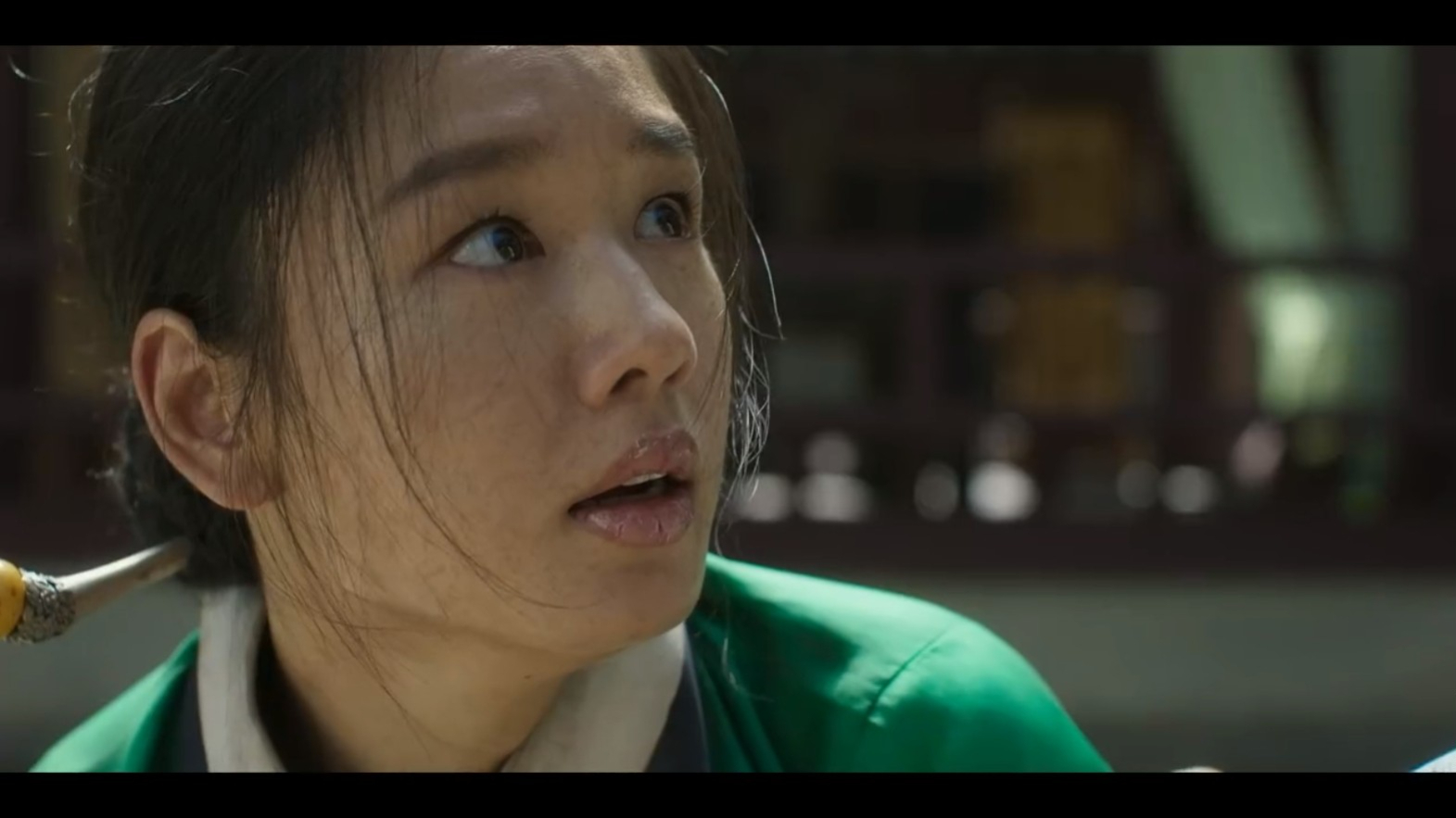
It’s been a long wait (okay, several weeks), but we’re finally back! After a seriously messy breakup, our leads have gone their sad, separate ways. Still, both are piecing together a life they can be proud of — or at the very least, not ashamed. But they’re soon faced with a daunting question: when those around them are suffering, what are their responsibilities? And do they ever end?
EPISODES 11-12

It’s rough when you’ve been through the long-distance breakup of a lifetime, and it’s centuries too early to stalk your ex on Instagram. All you can really do — at least if you’re Jang-hyun — is get roundly drunk each night, wallowing in desperate fantasies. Meanwhile, every day is horrific. Joseon prisoners of war are chased down by mercenaries, then dragged back into servitude and torture. Jang-hyun takes his usual place in those nightmarish fields, feigning complicity, whilst sabotaging the hunters where he can — especially his mysterious blue-robed frenemy.
One day, he sees her race after an old man whose cut heels are a mess of blood. He’s shielding several terrified children. Hurtling across the grass, Jang-hyun beats her to it — only to come face to face with his unlikely father figure, the indomitable Goo Yang-chun! And just when we thought we’d seen every shade of heartbreak on this poor man’s face. Luckily, he’s in a position to help: our masked mercenary’s feeling merciful, and when Jang-hyun asks her to look the other way… well, technically, she doesn’t say anything. But she does step aside.
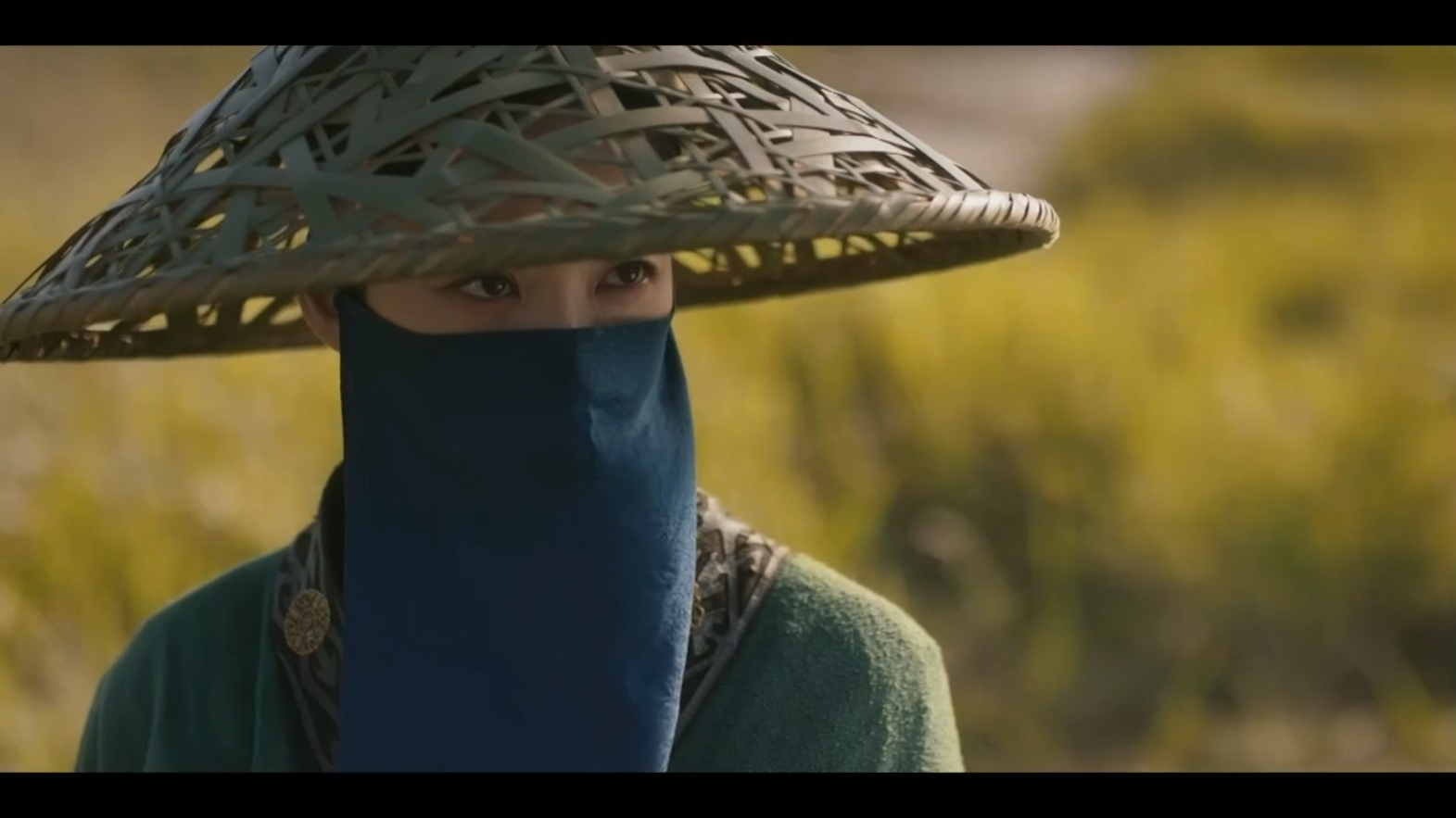
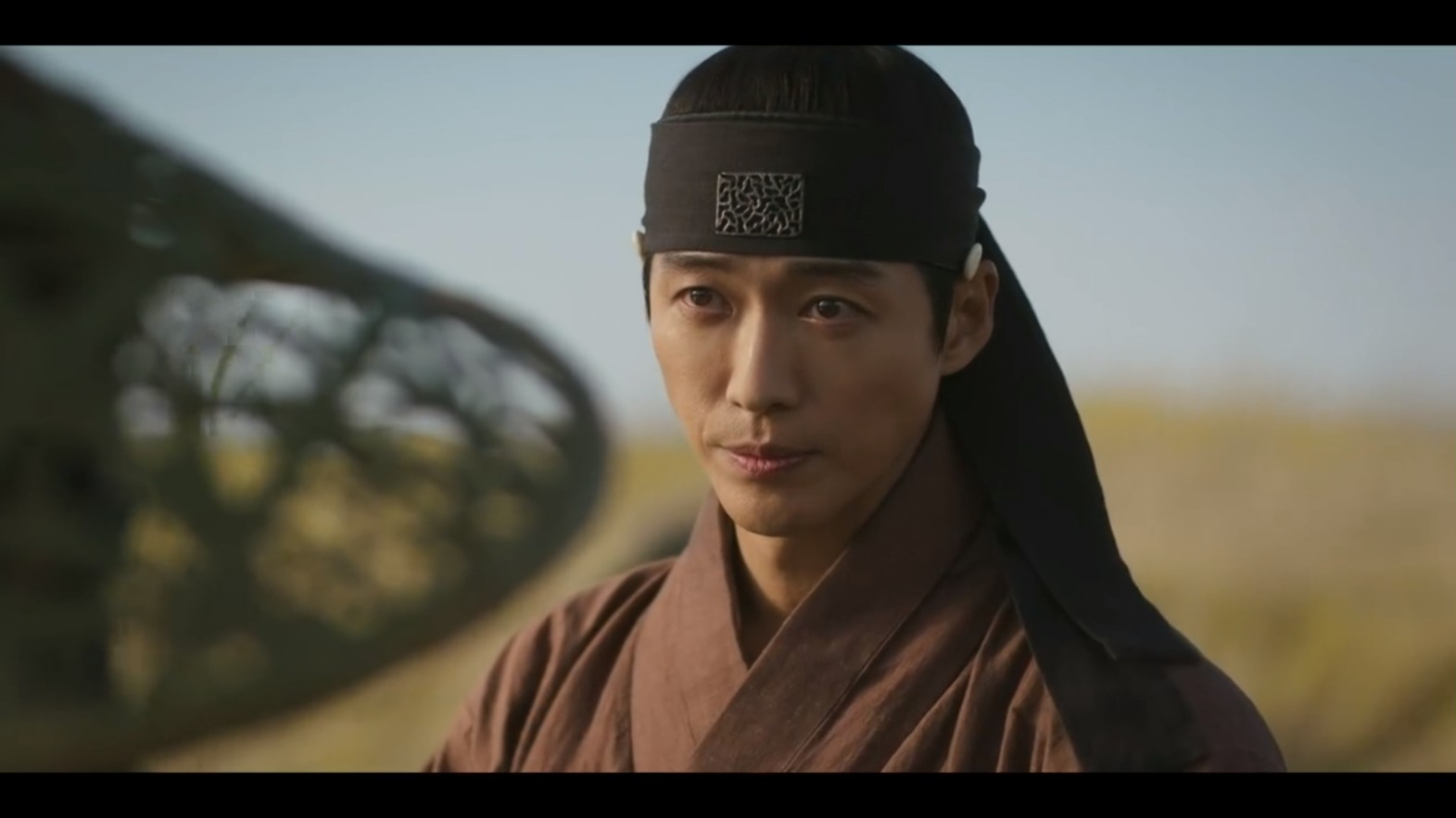
With blood streaming down his forehead, and a baby in his arms, Yang-chun doesn’t hide his disgust at the thought that Jang-hyun has turned collaborator. Naturally, nothing could be further from the case. According to Goo Jam, this is all thanks to Ryang-eum’s weapons-grade puppy-dog eyes… but let’s be real, our hero was never going to sit by and let people suffer. Long story short, his home now shelters dozens of former captives, all painstakingly purchased via his dwindling silver supplies, under the pretense of selling them for profit.
Still, despite his clear-ish conscience, he’s not in the most stable of places. Neither, for obvious reasons, is Yang-chun. The latter tries to distract himself with wine, women and song — but none of these quell the nightmares. Jang-hyun, for his part, plasters on a cheerful face, then weirds out a nearby gisaeng by asking her to call him an ugly piece of rock. (Granted, she’s probably heard weirder.) That night, he and Yang-chun slump together on the stairs. At least they can be not-okay together.
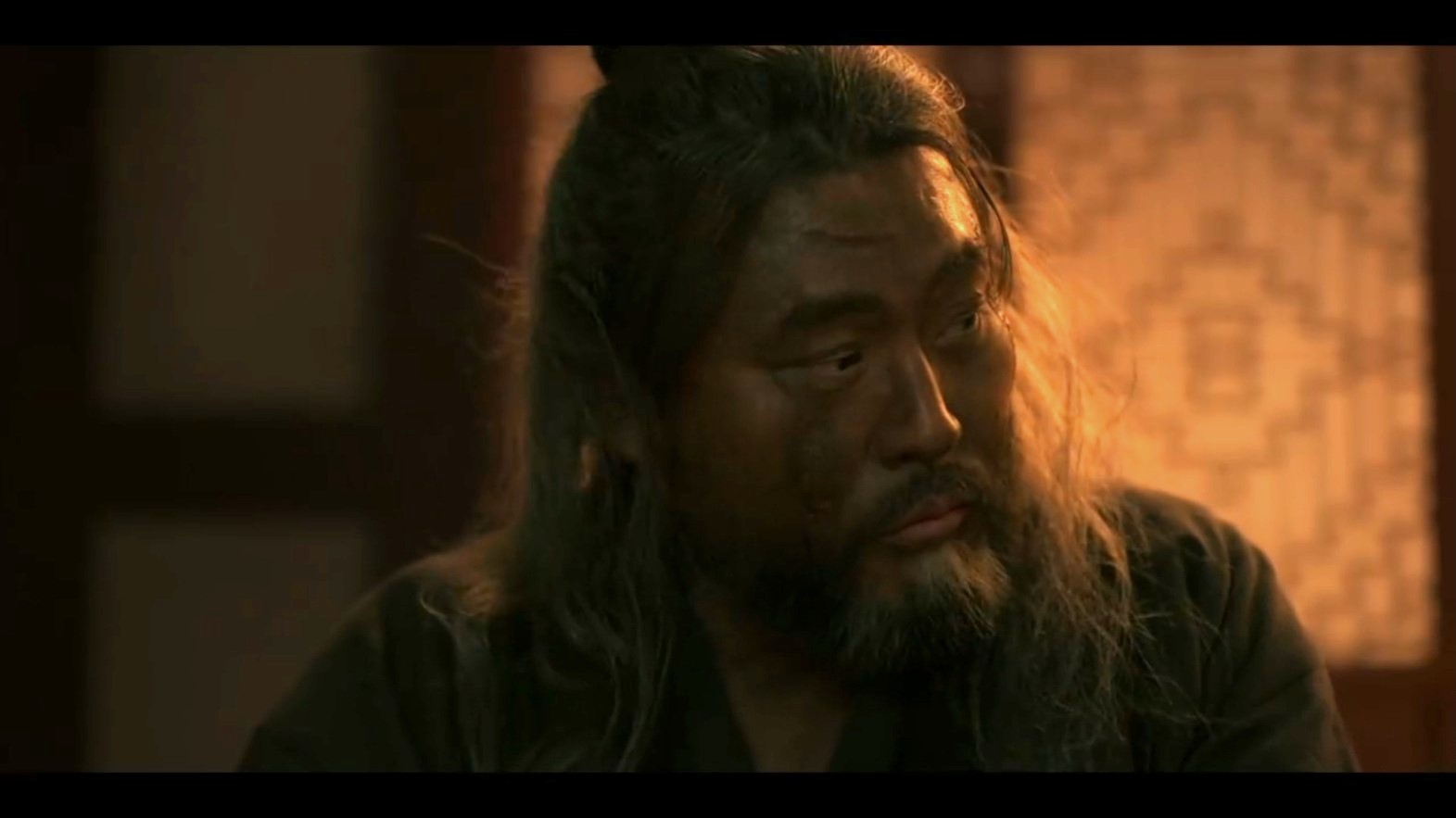
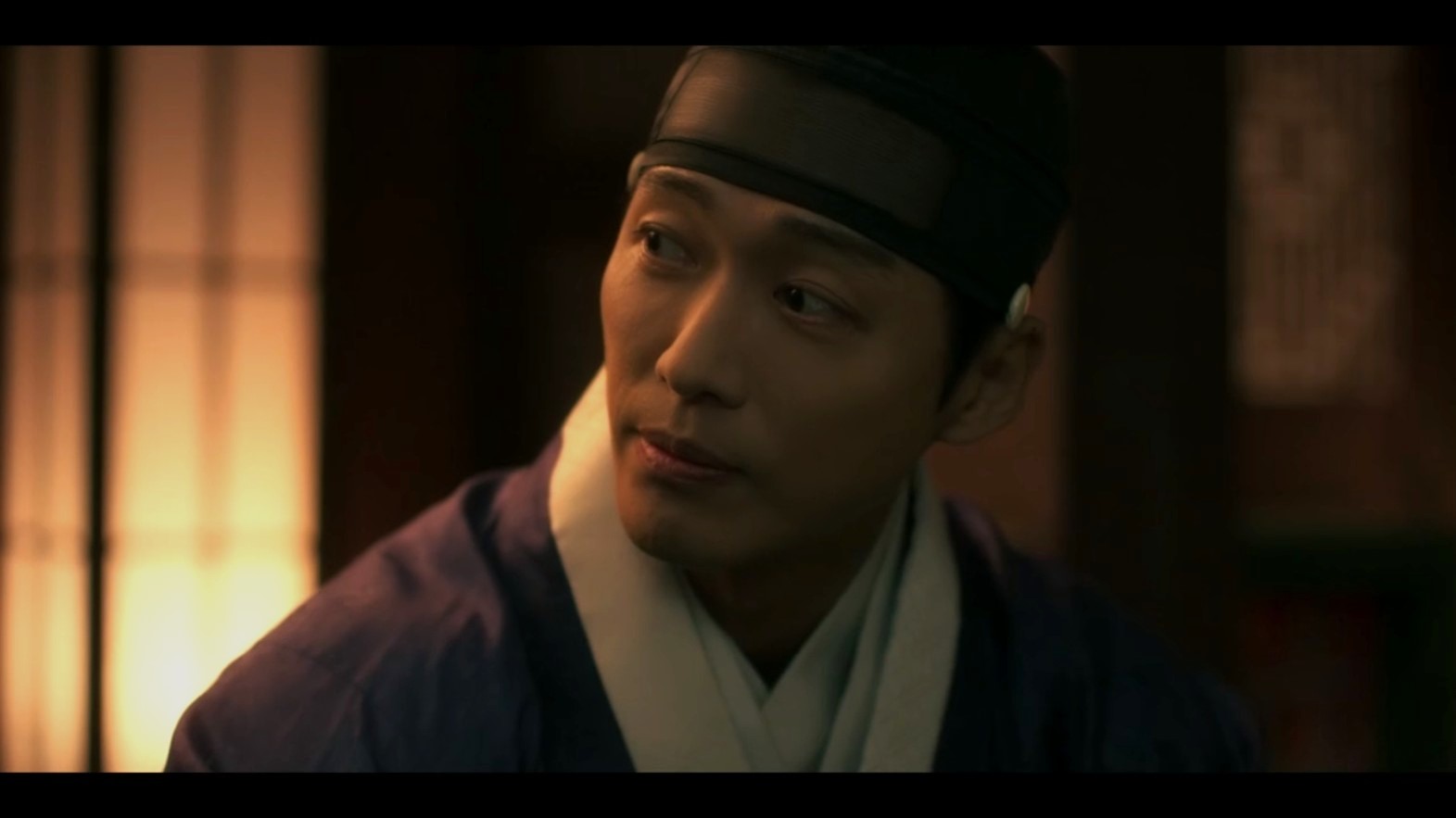
The problem with being a decent human being during a military occupation is that you can never really stop. When Jang-hyun hears women screaming in the palace grounds, he’s urged to turn a blind eye. Inconveniently for him, he actually does happen to be a good person. He turns. He looks. He sees an all-too-familiar face. It’s the happy-go-lucky teenage gisaeng from all those episodes ago: Young-rang. She and her fellow captives have been forced to serve the Qing prince. They live in fear of his sadistic consort, who delights in having boiling water poured over the heads of her rivals. Something must be done.
Neither Goo Jam nor Yang-chun are thrilled at risking their lives for women they deem “tainted by barbarians.” Plugging his ears against the background strain of misogynistic grumbling, Jang-hyun begins plotting a rescue. Part one goes off without a hitch: Young-rang and the others are smuggled out of the palace in wheelbarrows full of paper. But that same night, more prisoners cross the dreaded field where bounty hunters lurk. They end up cornered. Yang-chun rises to the occasion, fending off the hunters with a single spear — and occasionally, his teeth. Soon, Jang-hyun comes racing to the rescue, in a whirl of daggers and protective rage.

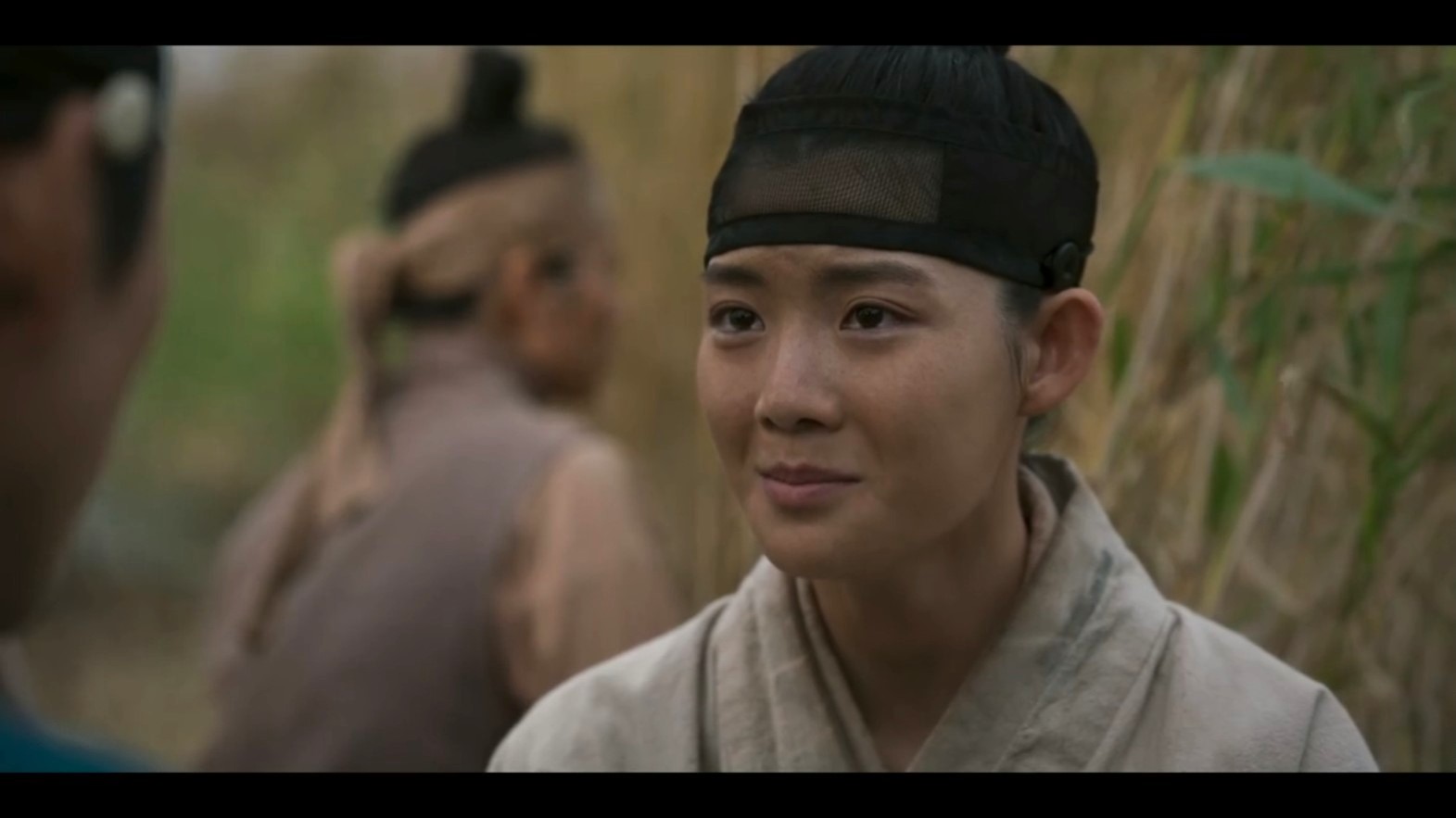
Our heroes emerge battered but unbroken. Before the women begin the perilous journey back to Joseon, Jang-hyun faces Young-rang. No man in his right mind, he says, would call you tainted. Are you tainted if a dog bites you? No. Fiercely kind, he wipes her tears — and as she leaves, he silently wishes her luck.
Back in Hanyang, life goes on. Everyone copes in their own ways. Gil-chae is raking in cash, and steadfastly refusing to acknowledge a single issue in her marriage. Ryang-eum is giving heterosexuality a shot, in an awkward situationship with a woman he can’t bear to touch. But crisis strikes when, following pressure from the Khan, the king issues a horrifying edict. All escaped Joseon prisoners of war are to be caught and returned to Qing.
And so, the hunt begins. A deeply upsetting montage ensues: faced with the prospect of being violently dragged from their homes again, many choose to mutilate or kill themselves. Due to the steep bounty on their heads, their neighbors turn traitor. And no one — even our filthy rich heroine — is above suspicion. Gil-chae ends up in a legal quagmire for harboring a former prisoner: an old man who begs her to save, if not him, then his grandson. She’s no saint. She prevaricates. She’s terrified of ruining the life she’s built. But after a few hours’ in her thinking barn, she knocks the dust off her conscience, and bribes an official to set the boy free.
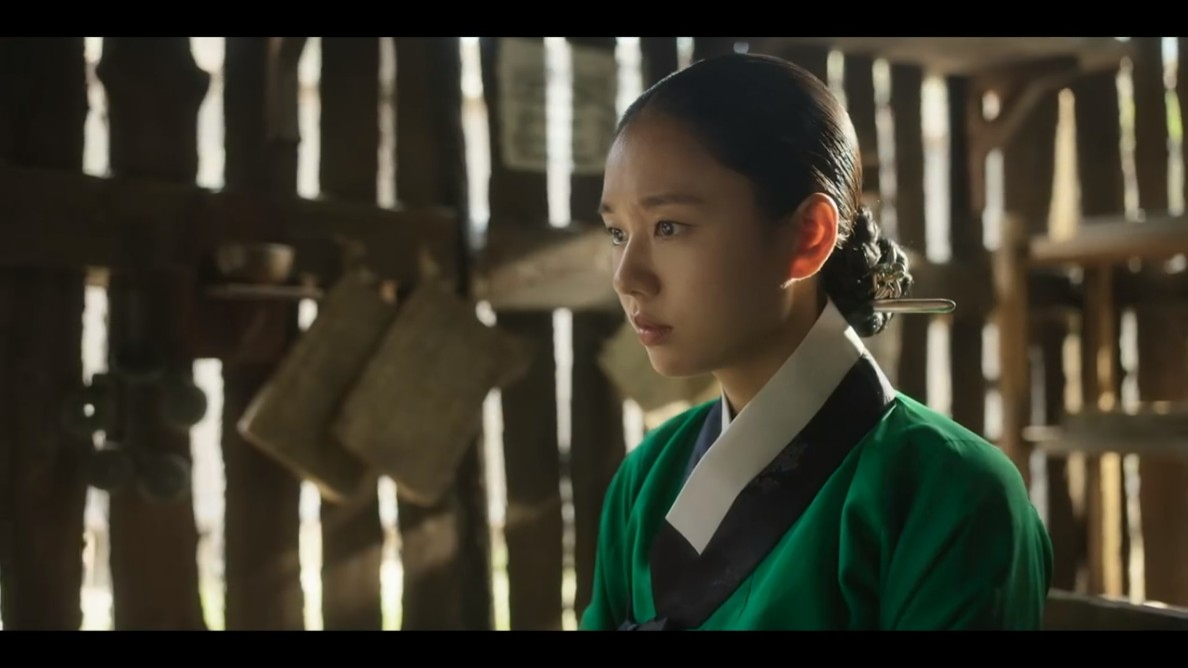
Alas, this triggers a series of unfortunate events that lead to serious jeopardy. The officials sent to recapture escaped concubines have hit upon an ingenious solution: substitute random bystanders who bear faint resemblance to the previous victims, and hope the Qing prince is too distracted to care. And what better distraction than the lovely, legally implicated Gil-chae? Gil-chae and Jong Jong are seized in the street, right before the crying child’s eyes. Soon, they’re back in the nightmare scenario they never thought they’d revisit: bound, held at sword point, making their exhausted way across the border.
Elsewhere, chaos hits the court. The crown prince is informed that from now on, members of the Joseon embassy must farm for themselves. This is hampered by the fact that they’ve only the vaguest sense of which way up a rake is meant to go. Well — all besides the crown princess, who actually paid attention when her mother ran a household. Regardless, they need farmers, and fast. Jang-hyun sees an opportunity to rescue more of his countrymen. Why not use the captives from Joseon?
And so, despite warnings, the crown prince steps into the slave market. It’s sheer hell. Blood-stained and filthy, people are beaten in pens. Others are dragged by the neck, bound in stocks. There are children in cages. Only Jang-hyun refuses to avert his eyes, voicing a truth none of his companions dare acknowledge: this has been happening for years. A woman is dragged onto a stand. Her captor squeezes her jaw to show her teeth, as the crowd jeers for her to be stripped. At this, the prince breaks, bolting from the crowd.
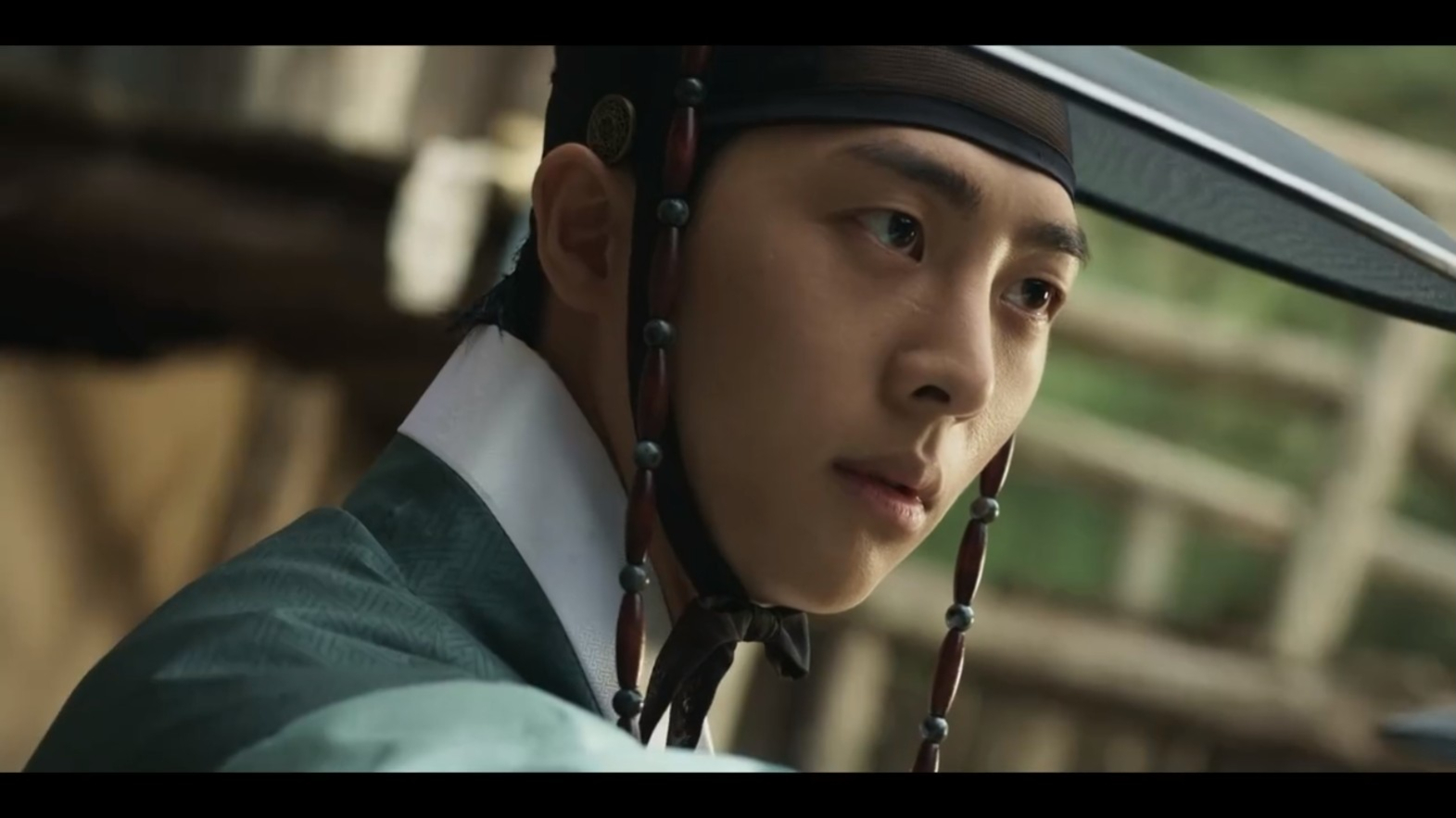
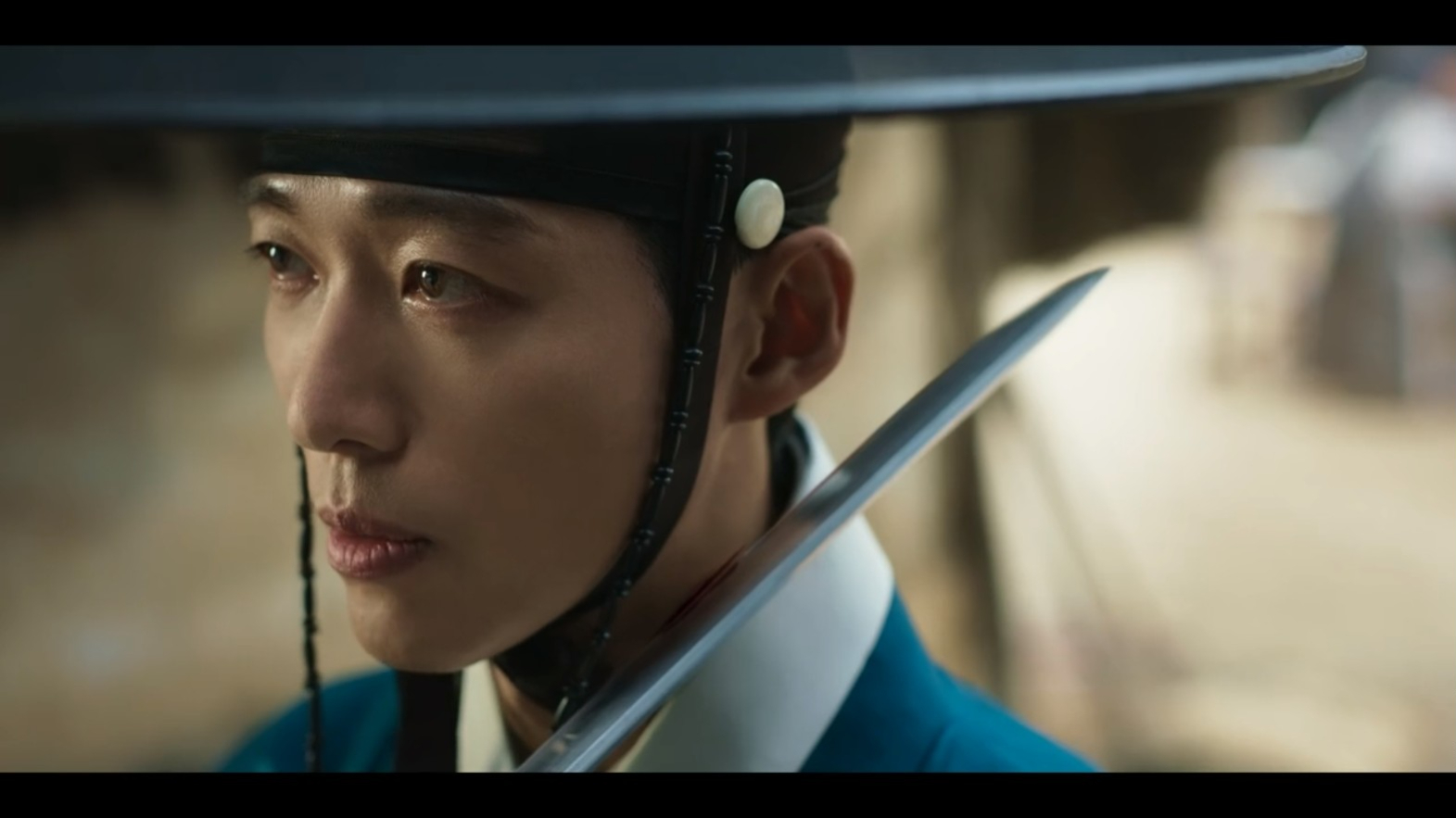
How, he asks, could a Joseon woman bear this humiliation and choose to stay alive? How, Jang-hyun snaps back, could the Joseon king bow to his enemies and choose to stay alive? Why is only one situation deemed pitiable? In a flash, the prince’s blade is at his neck. If you truly believe, says Jang-hyun, with icy calm, that those people should die — kill me here and now. The prince wavers. The blade drops.
Later, once both have had time to compose themselves, Jang-hyun rewards him with honesty. A long time ago, he confesses, someone I knew chose to die rather than live humiliated. I was furious. I didn’t understand. I came to Shenyang because I wanted to know: how much could you endure? And yet, you have done well. You have endured honorably. So please, keep going — and I’ll be comforted for hating the one who gave up her life. To his pleasant shock, the prince actually listens. Whether due to lack of silver, or — more likely — a strong sense of sympathy, the farmers Jang-hyun purchases are all old men. With his own fate uncertain, the prince cannot promise them their freedom. But he earns one of Jang-hyun’s genuine smiles as he pledges that if he ever sees his home again, they’ll be there with him.

Meanwhile, on the journey to Shenyang, Gil-chae summons the same strength she did in wartime, to protect those around her. She trades a costly ornament to let a dehydrated Jong Jong ride in the cart — even letting her captor fish it out of her dress. The one, futile hope that keeps her going is the notion that they’re different from their fellow prisoners: they weren’t captured in the first place. That, and a secret note written in her own blood, because our girl is hardcore. The latter will eventually make its way back to her husband.
In Shenyang, they kneel in the square. Members of the Joseon court cluster to watch, having been ordered to do so by the Khan. As ever, only Jang-hyun refuses to avert his eyes, looking each atrocity in the face. Escapees are dragged to the front. Blood spurts as heels are cut. One of them is the man Jang-hyun helped smuggle across the border. Amid this horror, his eyes catch on a green silk dress. Then, the top of Gil-chae’s head. Something half-readable flickers in his face — but by the time he looks away, it’s uncertain if he recognizes her.
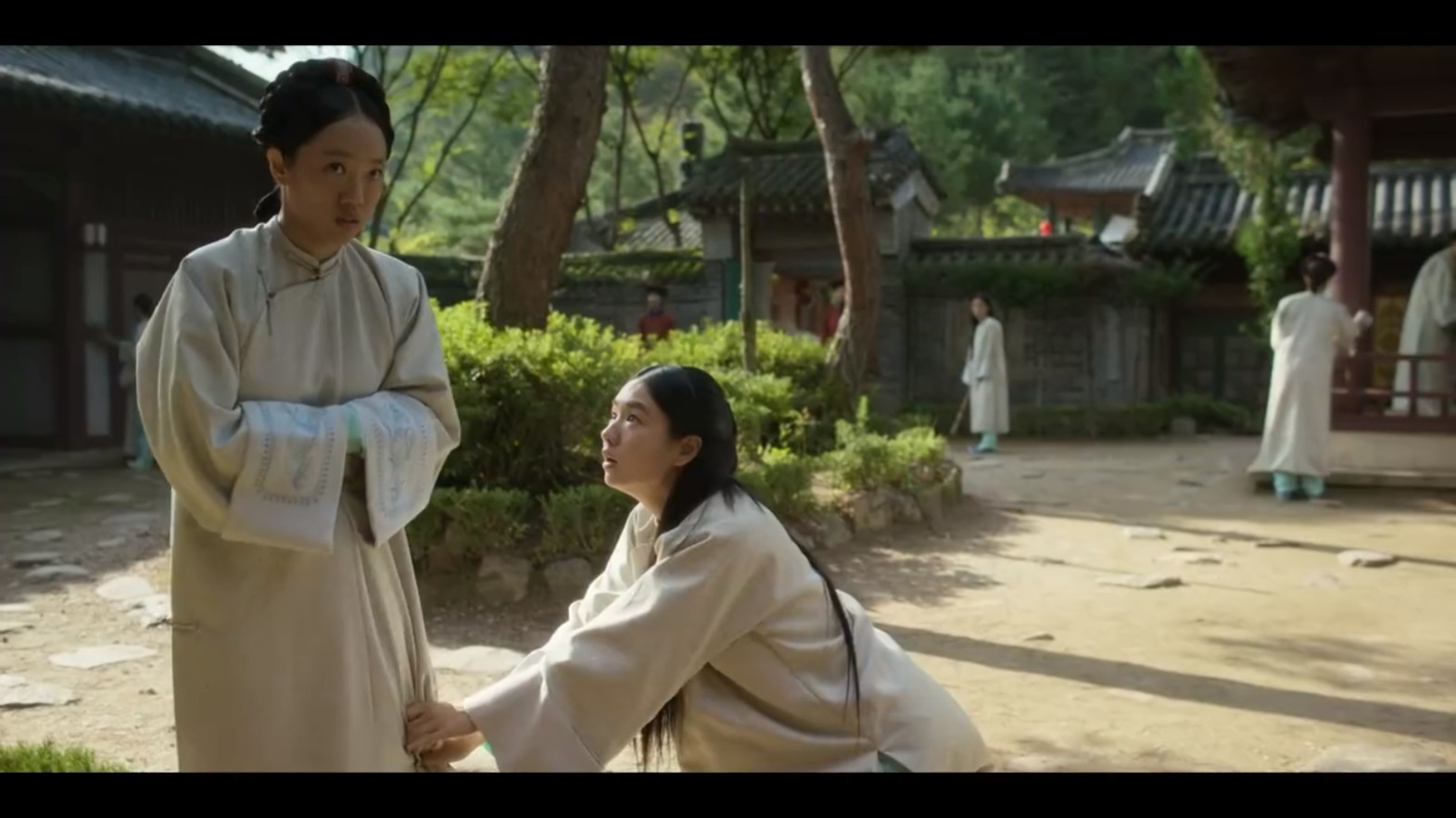
The women are ushered to the palace. With dawning horror, Gil-chae pleads with a Joseon concubine to speak on her behalf. Doesn’t anyone get it? She’s noble — she’s not supposed to be here! It’s hardly the greatest pitch, but after several rounds of pestering, the concubine relents. Later, when the Qing prince and his entourage pass, Gil-chae throws herself before him. She reels off the sentences in his language that the concubine had taught her. But she’s been the victim of a cruel prank. The words she speaks? Please let me serve his majesty. It is my only wish.
Instantly, she’s hauled to her feet by the same concubine who terrorized Young-rang. The boiling water looms. But just before the torture begins, she receives an unwelcome reprieve. The prince has selected her to serve him. Gil-chae is tugged away, bathed and inspected for blemishes. Desperate measures are needed. There’s one thing her pride won’t allow, and that’s contacting Jang-hyun for help. Still, she’s willing to abandon vanity. Alone, she smashes a pot in an attempt to scar her face. She manages just a dainty scrape at her temple, but it’s enough — enough, that is, for a ticket to hell on earth. She and Jong Jong will be sold at the slave market.

Caged and bloodied, the women cling to one another. Buyers leer. Joseon captives are paraded before shrieking crowds. Amongst this, Gil-chae peers through the bars to see the old man who worked for her — the one whose grandchild she saved. Suddenly, a cry splits the market: smallpox! A man collapses, foaming at the mouth. The slave-seller comes to investigate, before being tackled. It’s an escape! Prisoners flee in every direction. The old man, generous even in misery, smashes the lock on Gil-chae’s cage.
Meanwhile, Jang-hyun journeys back through the fields, where he spent the night a) purchasing a cow, and b) regaling a bemused farmer’s daughter with a lengthy monologue on heartbreak. He spots mercenaries riding through the grass. They’re in hot pursuit of another crowd of prisoners. Hurtling into action, he rides out to distract the blue-masked hunter. He watches her notch an arrow. Following her gaze, he sees a flash of blue and green silk. Just as Gil-chae turns to see his face, he raises his own bow.
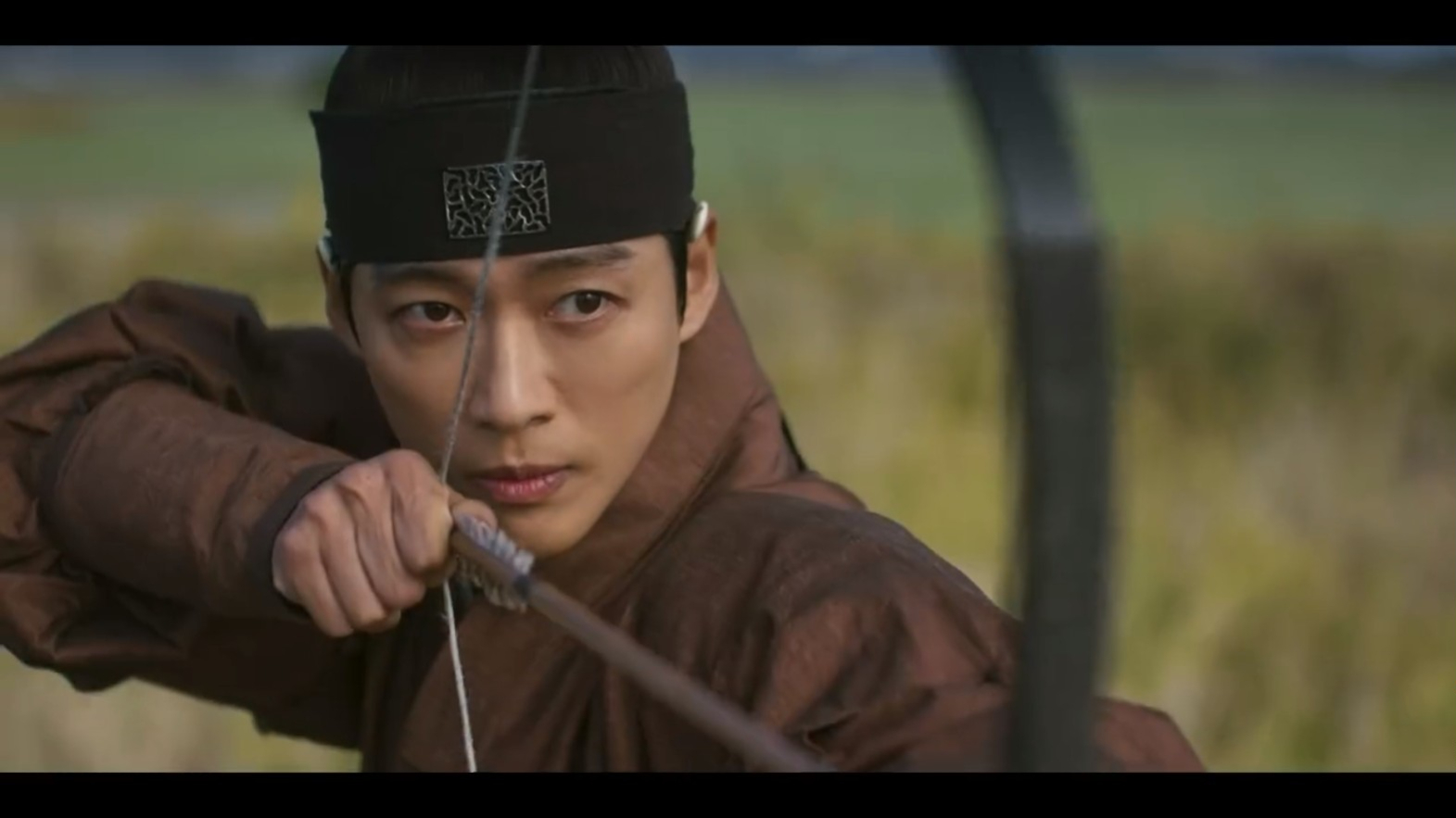
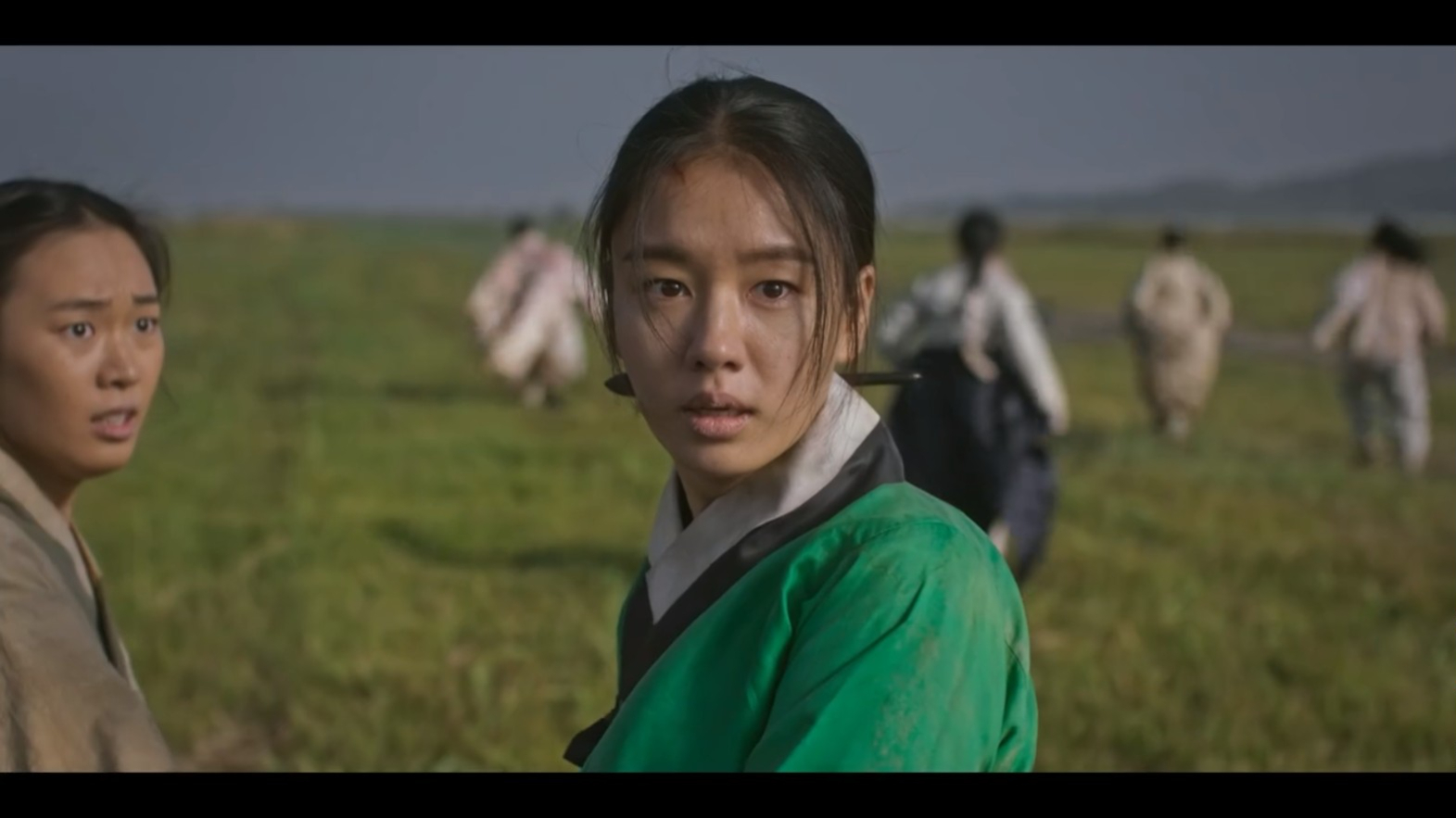
Folks, they have hit the ground running with this gorgeous set of episodes. Once again, they’ve succeeded in combining a vast sense of scope with a focus on the plight of individuals. I love how the narrative never forgets the people we’ve met on the way, or the consequences they experience. The captive Jang-hyun helped escape is recaptured after the king’s edict. The girl who was too frightened to run with Young-rang is punished in her place. The old man and his child never disappear from sight. Instead, everything is interwoven, and minor characters are always afforded sympathy.
These episodes truly showcased the misogyny permeating both Qing and Joseon society. It’s a nasty blow, the reminder that plenty of Joseon men think the female captives would be better off dead. Similarly, social hierarchy is always at the fore. This week, I couldn’t stop thinking about a line from Mr. Sunshine, where a noblewoman fighting for her country’s independence is asked, “Who lives in the Joseon you’re trying to save? Can butchers live? Can slaves live?” This show is asking similar questions. Why are certain people shown more compassion than others? Why must subjects suffer for the sake of a king?
As for the final, million-dollar question… did Jang-hyun recognize Gil-chae and Jong Jong at the square? My heart says yes. There was something in his expression — it was crystal clear! Perhaps he thought he was seeing things. Or perhaps he’s been orchestrating a plan for their escape behind the scenes. One thing’s for sure: I have faith in my Namgoong-Min-reading skills. And so, for our final screenshot, I will finish with one of Jang-hyun’s fantasies, because if I’m an overly optimistic romantic… well, at least I’m in good company.
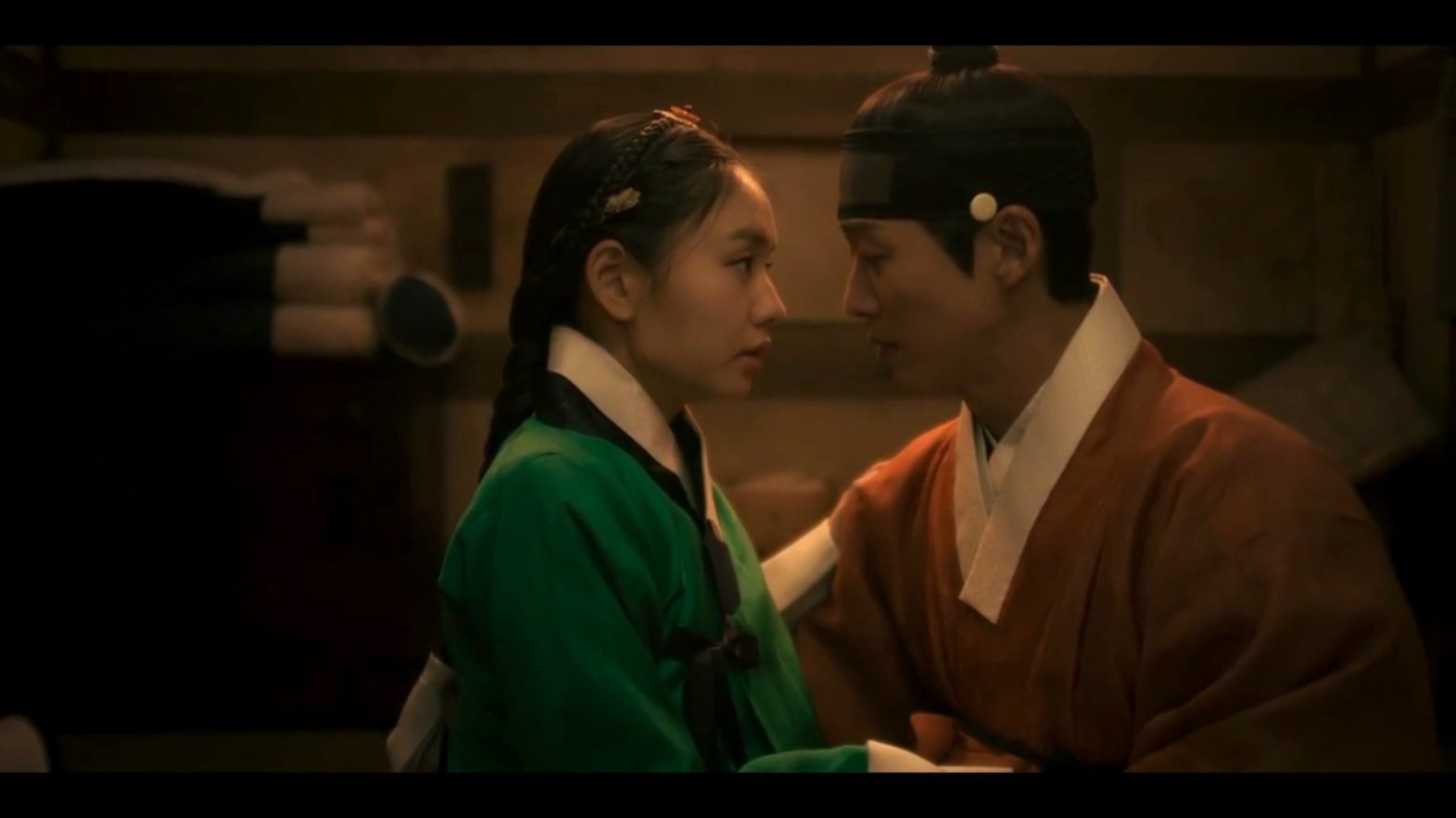
RELATED POSTS
- Premiere Watch: My Dearest (Part 2)
- Ahn Eun-jin finds her way back to My Dearest Namgoong Min
- [Beanie Recs] What to watch while waiting for My Dearest Part 2
- Premiere Watch: My Dearest
- Falling in love with My Dearest’s Namgoong Min and Ahn Eun-jin
- Ahn Eun-jin finds her way back to My Dearest Namgoong Min
- News bites: July 29, 2023
- News bites: July 15, 2023
- News bites: July 11, 2023
- An epic love story awaits with MBC’s My Dearest
- News bites: June 29, 2023
Tags: Ahn Eun-jin, Lee Chung-ah, Lee Hak-joo, My Dearest, Namgoong Min
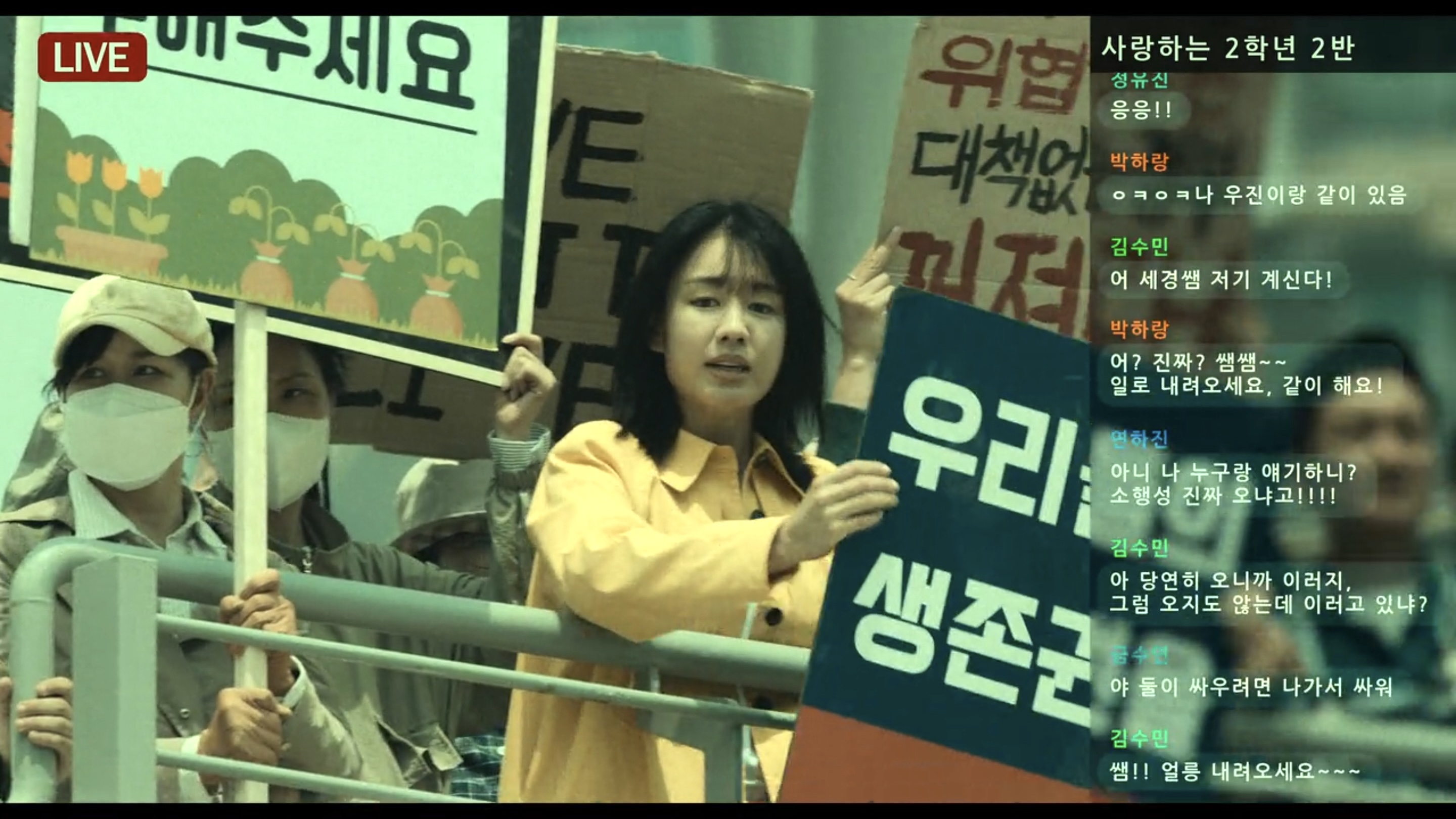
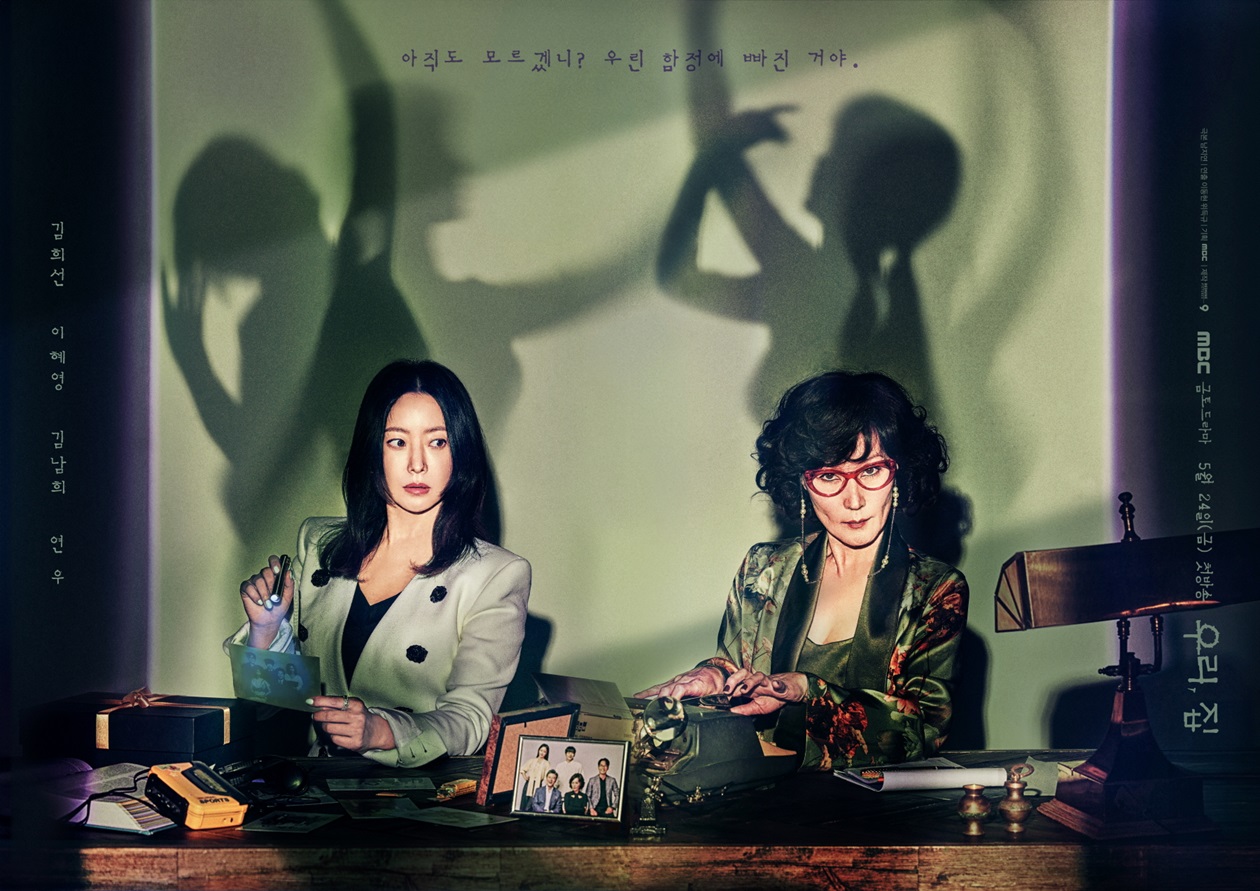
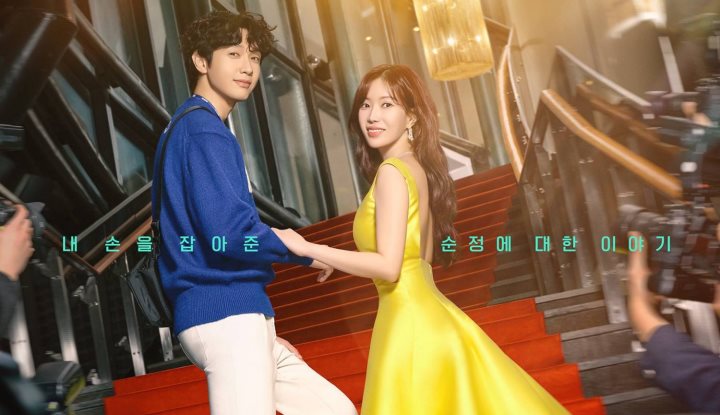
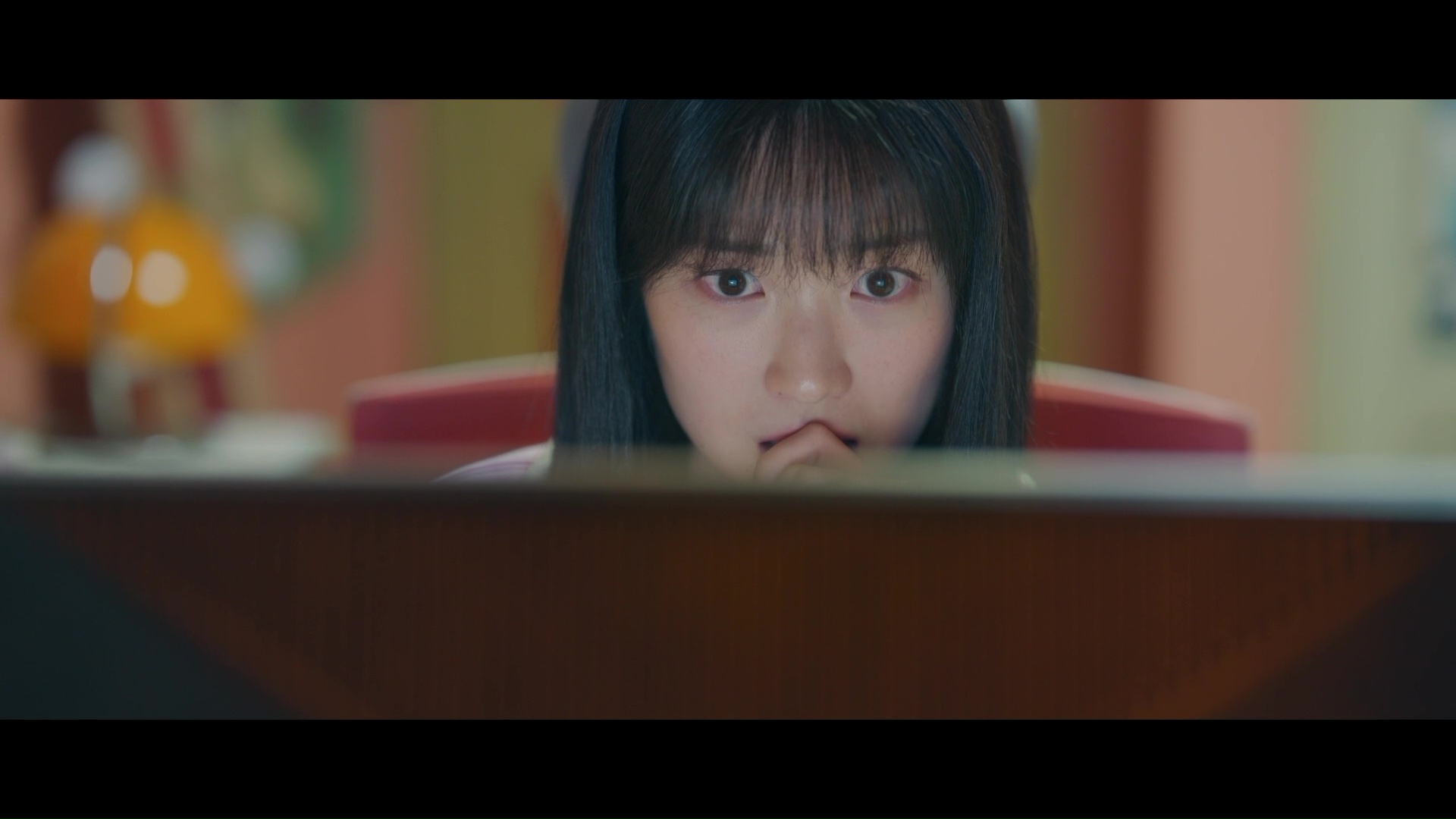
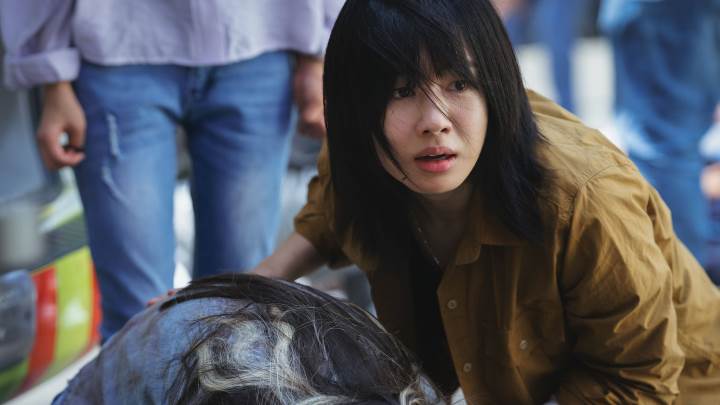

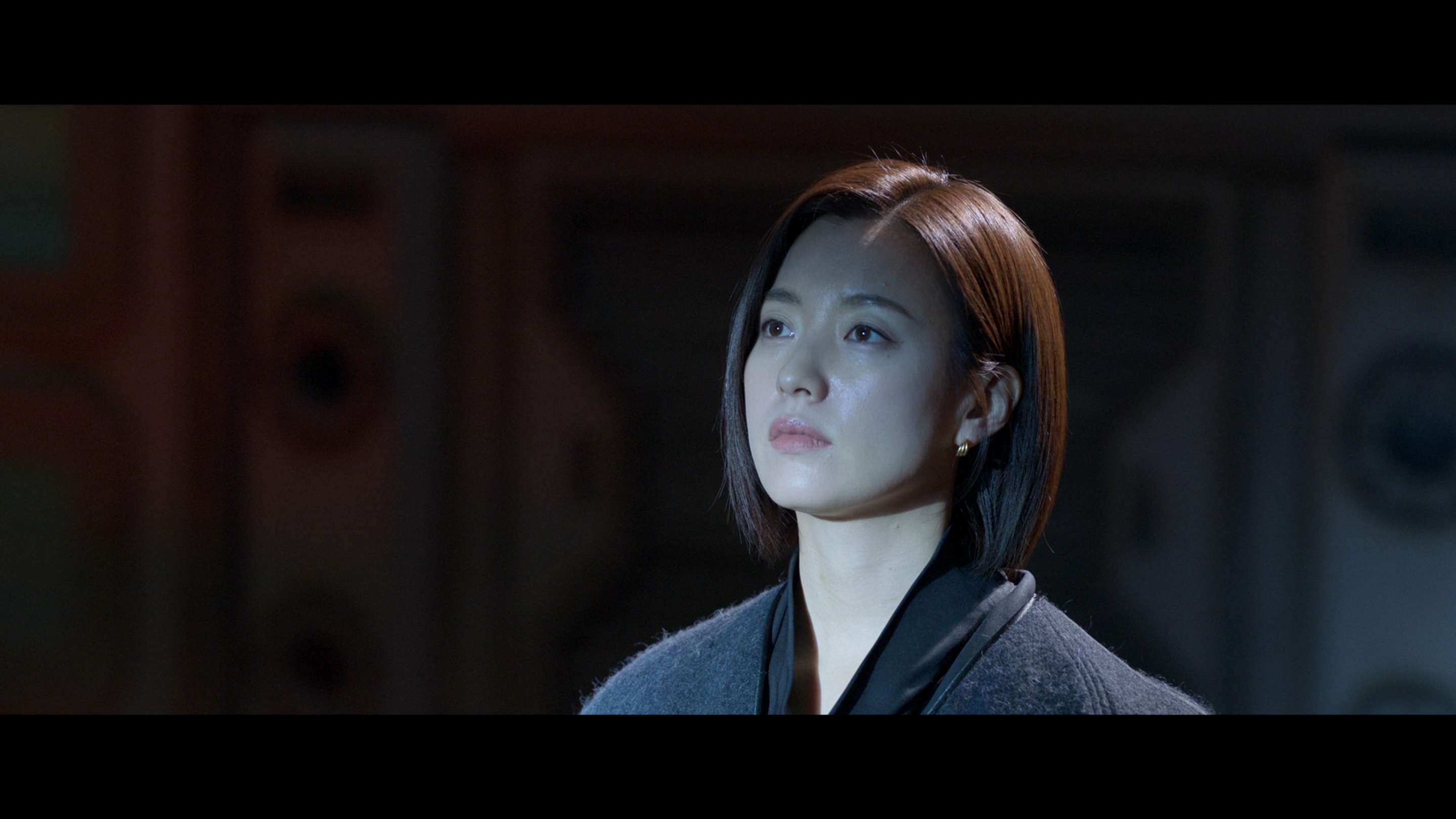
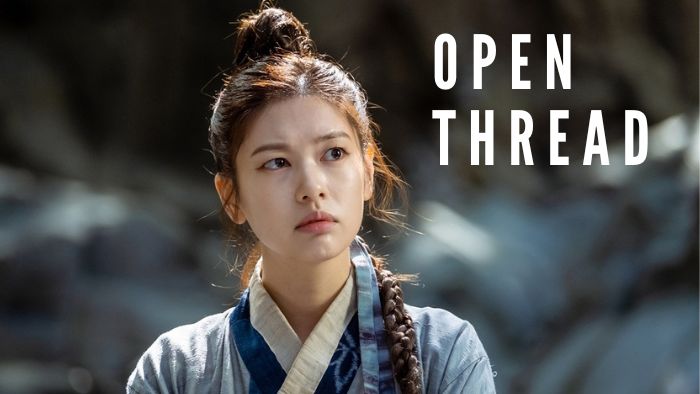
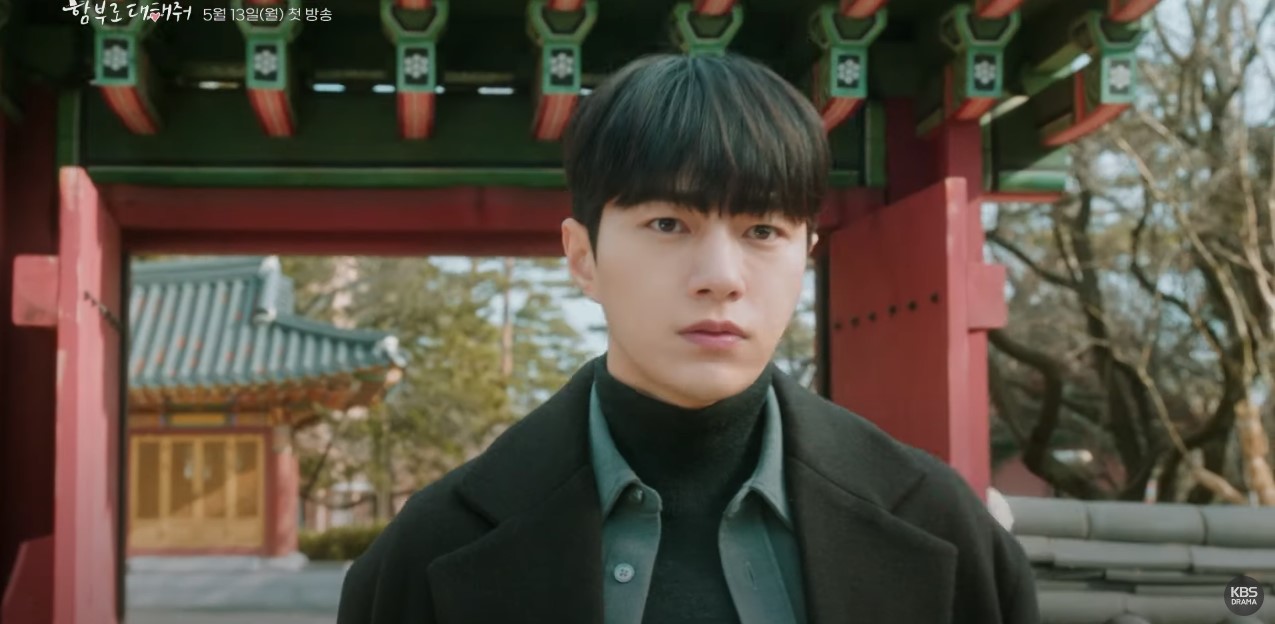
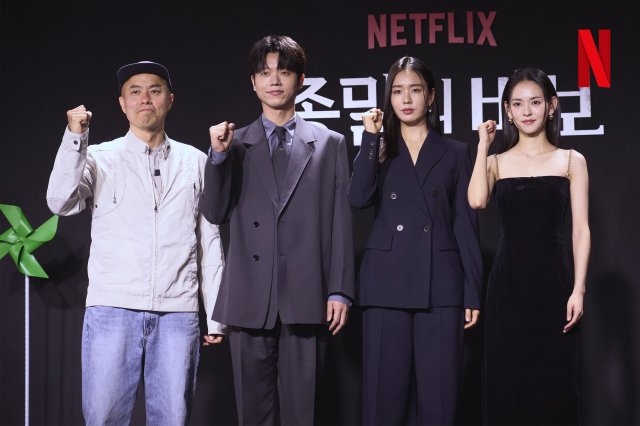
Required fields are marked *
Your email address will not be published. Required fields are marked *
1 💜🍍☠ Sicarius The Queen of Melonia ☠🍍💜
October 15, 2023 at 2:07 PM
For @kiara
Episode 11:
I struggled to get through it, especially the first half. The second half was a tad more entertaining just because the escaped slaves thing added a bit of stakes but ultimately that also was superfluous and poorly set up, so it was cheap entertainment:
I can handle angst and pining but not at the expense of dumb writing, which this clearly has maintained over the break and is in a rut of.
So I’m just not really feeling the separation angst; his pining, RE crying, and found her staring at the Moon after her wedding night to be tasteless and hardly romantic.
The background of the boys stealing slaves from under the noses of the Qing previously should’ve been established in prior epsiodes and especially before they did what they did in 10 with Ryang Eum’s character. He can’t be truly sympathetic as a half Qing ex slave when you’ve constantly only focused on his petty ruinous jealousy and one sided crush instead of his and JH’s backstory.
Then the slavery sub plot is revealed to only serve as background morbidity to get Gil Chae to Qing and foreshadow what is to come, rather than having a place in the story or history itself.
Additionally for which she didn’t need to be married to SL guy in the first place, or for him to even exist.
So that whole arc of episodes 9 and 10 still didn’t need to happen either, and only exists to drag out the angst to torture the characters and the viewers.
The only reason I can see her being married for is as @Kiara had also pointed out, to drive home and capitalise on the spoiled women angle, and put Gil Chae through it even more, which is both really trashy, but also is contrived because there’s no *internal* story reason or historical background for this to happen, unlike the first half which made sure its stakes, plot and therefore its tension were based in something and paralleling something and so the heaviness of the subject matter was more enjoyable and also more justified.
Not saying this^ didn’t happen at all in history, it did, and so did all the other awful things that happened in these eps, but the story now feels cut up and disjointed rather than everything flowing and being connected and making sense and the writing using all the parts and locking them altogether to tell the story;
A Qing envoy just oh so conveniently HAPPENS to spy GC, tales a liking to her and kidnaps her, and there's only the bare minimum of effort of tying this in to the rest of the episode or the story, or even history. Can you say CONTRIVED any louder?
They missed their opportunity for getting GC to Qing in a way that felt right, and did this instead.
Required fields are marked *
💜🍍☠ Sicarius The Queen of Melonia ☠🍍💜
October 15, 2023 at 2:10 PM
(Ofc now I’m even more mad about 9 and 10.)
And I found some of the actions of JH and GC to be a bit OOC:
GC has proven that she’d do anything to survive herself in the past, but I felt her diatribe at her worker to be off. She went to desperate measures on the island to escape with her and the girls, and this was a terrible decision to make (one that, along with the dead Mongol I think should still be haunting her), but the way the slave conversation was handled didn’t feel as justified as that hard decision on the beach, and there was no set up for why she might be acting thus, that we might draw from the show itself. Like okay yeah she doesn’t want to be sent to Qing either. But this is GC. She’s savvy and cunning. I feel like her figuring out a way to defend the worker as well as his grandson and get them both out and her name clear, without just name dropping her husband, would’ve been more in character.
And, if she’s become complacent in her marriage and status, then SHOW that.
The GC who bites her own finger to send a message to her husband and let's a man grope her to give up her place on the cart for her servant girl, doesn't line up with the GC that just let one of her workers get dragged back to Qing,.
Additionally, it’s not completely untoward, and I’d like to think it’s just a moment of good character development, but JH of part 1 basically only ever did things because of GC, those associated to GC, and only very occasionally RE and other exceptions.
If his motivations have changed, we need to see how and why, and the process fully.
He can’t be wanting to die at the start of 11, and then we flashback to actually, he saved a bajilion slaves last half, you just didn’t see it, but all that time he was also neglecting GC and never sent her word of any kind, and was still anti commitment (whilst risking his life not just for himself in Qing but apparently 100s of slaves, just cos RE looked at him with puppy eyes… cos that adds up…)
He can’t be wanting to die, lost all motivation and will, and justifiably so with how you set up his character (a bitter cynic btw, who has 1 joy in life… and it's not RE's eyes) and what we know before this, at the start of 11 and then being the benevolent Robin Hood and greeting all his friends equally and with equal grace.
Either put something in there that justifies this writing decision, and shows the many facets of Jang Hyun PROPERLY… Or I’m going to put your jumping jack character writing in time out also.
It’s not impossible! We know he cares more about the people than his king or politics.
We know he avenged the old couple. We know Ryang Eum is/was important to him! The exceptions and his cloaked backstory would be good start!
But for crying out loud, make it make sense.
Episode 12:
I was bored, I didn't feel like the stakes were genuine, the stuff regarding JH and the Prince oddly feels like too little too late even though we're only on episode 12, and they...
Required fields are marked *
💜🍍☠ Sicarius The Queen of Melonia ☠🍍💜
October 15, 2023 at 2:12 PM
... and they keep faking out and baiting us with the reunion, which is cheap, especially to keep using their reunion music over a non reunion. Oi.
(Oh and the end of EP 10 time jump bait now looks even tackier as well.)
I have what I like to call the Four Horseman of the Dropocaplypse, in my list of crimes a drama can commit in Story Death against itself or the viewer, and they are:
Stupidity (in itself), Annoyance, Apathy, and Boredom (in me).
Guess how many My Dearest is trying to check off its bucket list.
This is not a list you want your drama even looking at, even if I do manage to get through to the end.
Unlike for some, the break did not do this show or my investment in it any favours.
Required fields are marked *
Mrs Buckwheat
October 15, 2023 at 3:40 PM
And I'm also annoyed with the end of episode 10 time jump bait with JH, that was low to do to the viewers.
Required fields are marked *
💜🍍☠ Sicarius The Queen of Melonia ☠🍍💜
October 15, 2023 at 4:15 PM
It was a dumb and tasteless 💯
Isa is always time travelling
October 16, 2023 at 4:21 AM
I was very confused about the timeline in these two episodes.
I was trying to figure out when everything was happening, but it wasn't easy.
I liked the episodes but the editing was confusing.
kiara
October 16, 2023 at 8:31 AM
I find both episodes boring, so I haven't finished it. I will try again today or maybe tomorrow.
Required fields are marked *
Mrs Buckwheat
October 15, 2023 at 3:36 PM
" to drag out the angst to torture the characters and the viewers"
I feel tortured after watching these two latest episodes, it was brutal and I'm left wondering how much angst and torture is enough for these characters? The show is really laying it on thick and as Sicarius mentions the actions of the characters felt somewhat disjointed from part 1.
Required fields are marked *
♡Peach_Mochi♡
October 15, 2023 at 3:51 PM
The time jumps might have been necessary to align plot points with certain events in history, but they’ve made it hard for me to follow the characters’ motivations and development. Feels like we have to fill in the blanks after seeing what they are doing several years later. Much of the magic in the first half was witnessing how gradually their regard for each other grew. We don’t get that anymore — just lots of suffering.
Required fields are marked *
💜🍍☠ Sicarius The Queen of Melonia ☠🍍💜
October 15, 2023 at 4:11 PM
The jumps and flashbacks in 10 - 12 imo aren't necessary for their historic timeline though.
The one in 10 was just blatant baiting of Lee Chung Ah and to end of a "cliffhanger".
The flashbacks regarding saving the slaves make as little sense regarding the historic timeline as they do the character development one, or the plot in Part 1.
Structure your story to make the most sense for your STORY ITSELF first, id est, character and story development, and trust your audience to remember what is important, and make the connections themselves, which is part of what makes consuming stories enjoyable anyway.
It didn't have a problem with balancing this in the first 6 episodes anyway.
Required fields are marked *
Mrs Buckwheat
October 15, 2023 at 5:39 PM
Yes, watching now makes me feel like I have missed an episode with the characters development and motivations.
Required fields are marked *
kiara
October 15, 2023 at 3:48 PM
Thank you @sicarius!
I need your notes to help me figure out this messy and confusing timeline.
Required fields are marked *
kiara
October 15, 2023 at 6:56 PM
PART 2, TIME LINE.
HISTORY and DRAMA: EPISODE 11 and 12.
I added Ming because the next major historical event will happen there. This is mostly history since the drama doesn't follow the historical time line like Part 1.
1640: HISTORY
JOSEON - The Crown Prince visits Joseon after 3 years in Qing (Episode 10)
QING - The Crown Princess gave birth to Prince Gyeongwan (2nd son) in Shenyang.
- The Qing dynasty captured the Evenk fortresses of Duochen, Asajin, Yakesa, and Duojin.
MING - Lǐ Zìchéng and the rebel army enter Sichuan (Approx 1115.6 miles to Beijing). Lǐ Zìchéng, birth name Li Hongji. Nickname: Dashing King. He was a peasant rebel leader (bloodthirsty Robin Hood) who overthrew the Ming dynasty in 1644 and ruled over northern China briefly as the Yongchang Emperor of the short-lived Shun Dynasty (he changed Ming to Shun).
DRAMA - Gil Chae and Jang Hyun went their separate ways.
- Gil Chae marries Officer Gu. (Episode 11)
1641: HISTORY
QING - March 14, The future King Hyeonjong (Yi Yeon) is born in Shenyang to Grand Prince Bongrim (future King Hyojong - episode 1) and Princess Consort Pungan.
MING - Li Zìchéng enters Henan ( Approx 424.02 miles to Beijing).
1642: HISTORY
QING - The Crown Princess gave birth to Princess Gyeongnyeong in Shenyang.
DRAMA'S timeline (from episode 11 preview): 2 years later, Jang Hyun in Qing hunting down Joseon runaway slaves. He runs into his hyungnim (Yang-chun), who has been on the run since the beginning of episode 9.
1643: HISTORY
JOSEON - July 28: Crown Prince Sohyeon's father-in-law, Kang Seok-ji died. The Crown Prince and his wife returned to Joseon for the funeral.
QING - September 21: Hong Taiji (Abahai), the 2nd khan of later Jin and founding emperor of the Qing Dynasty, died. His temple name was Emperor Taizong of Qing.
- October 8: Emperor Taizong's 9th son, Fulin (5 yr old), was crowned as the 2nd emperor of the Qing Dynasty. He was known as the Shunzhi Emperor: Dorgon (the late emperor's younger brother) and his cousin Jirgalang co-rule as prince regent.
- Crown Princess gave birth to Princess Gyeongsun in Shenyang.
MING - Li Zìchéng captured Xiangyang (approx 659.7 miles to the capital) and proclaimed himself "King of Xinshun."
DRAMA - Apparently, a new fictional character (Qing's new leader) is King Yoon Chin, according to AsianWiki. There is no mention of Emperor Hong Taiji's death or the Qing princes from Part 1.
I'm stopping here since nothing in the drama indicates we are at 1644.
Next in history- Hong Taiji's death and Crown Prince Sohyeon.
Required fields are marked *
WishfulToki
October 15, 2023 at 7:08 PM
**Apparently, a new fictional character (Qing's new leader) is King Yoon Chin, according to AsianWiki. There is no mention of Emperor Hong Taiji's death**
Well, that explains why I had no clue who the smarmy king was. Thanks drama for deciding to throw history out the window like that.
Required fields are marked *
kiara
October 15, 2023 at 7:40 PM
Does it make sense to go all fiction with Qing in Part 2? The Qings historical characters were fascinating and added so much to the story.
The king title here is meant for Prince Regent Dorgon. Writernim or the PD probably didn't know what to do with Dorgon. He was one of the Qing characters that I wanted to see in this drama.
Another thing, farming wouldn't work this late in the historical timeline. They had only one year or less in Qing before the transition from Ming to Qing began. They should have done this one year after they arrived in Qing.
Required fields are marked *
💜🍍☠ Sicarius The Queen of Melonia ☠🍍💜
October 15, 2023 at 7:50 PM
I think it's sad actually.
The tension the Qing army and court created within the first half was one of the best bits, and watching JH navigate it and nudge the Crown Prince along was what made it engaging, and one of those examples of how the actual history was clearly, we now know, doing the heavy lifting for the stakes.
I think having no mention of Hong Taiji's death, Dorgon or otherwise, and ficitonalising the Qing court now, is remiss, and not going to be in their favour.
angelshadows50
October 15, 2023 at 11:47 PM
Actually, I don’t think this is a fictional character. The 3 syllables Hangul text line identified him as 윤친왕 with the explanation of 왕야 [43’23 mn, ep. 11]. The latter transcribes as «wangha», Prince, addressed as Your Highness. That’s also how he is spoken about by the emissary who is responsible for kidnapping Gil Chae and Jong Jong (as he authorised it).
Kocowa translates him as «Prince Yoon Chin», the Viki team translates him as «Yinzhen or Prince Xun (Wangya)». The 3 Hangul syllables transcribe as «Yucinwang».
After a little digging, I believe we are talking about Prince Yu, better known by his Manchu name Dodo, the 15th son of Nurhaci and half-brother of Hong Taji. https://en.wikipedia.org/wiki/Dodo,_Prince_Yu He is a rather important figure in several armed conflicts with the Ming (also the final battle for Beijing), and especially in the aforementioned Chahar conflict.
The Qing picked up from the Ming a royal and noble ranking system and made it rather complicated. Amongst these there are 12 so called «iron-cap» princely peerages, of which Prince Yu was one. These peerages had shìxí wangtì, “perpetual heritability”, and only 12 princely imperial families had this privilege. Some of them were renamed at different point in times, so one peerage line may have different names. The princely peerage of Yu was bestowed upon Dodo as the first incumbrant (in 1636). The peerage was renamed to Prince Xin of the First Rank (Prince Xin) when Dodo's son, Duoni (1636–1661), inherited his father's title in 1649. https://en.wikipedia.org/wiki/Prince_Yu_(豫)
The only qualms I have with my own interpretation is that the actor who plays this role looks to be around 50 or so, but the historic Dodo died at the age of 35 in 1649 ; so in about 1643 he must have been 29 years. Considering that he is a man of the battlefields, yes, he will look older and worn out, but like a late 40s person …? Mind you, his portrait from the Palace Museum Archives shows a man looking like late 40s/early 50s.
So, now, unfortunately I have to start my day with lots of work here … wish me luck.
Required fields are marked *
💜🍍☠ Sicarius The Queen of Melonia ☠🍍💜
October 16, 2023 at 12:00 AM
Comment was deleted
💜🍍☠ Sicarius The Queen of Melonia ☠🍍💜
October 16, 2023 at 12:11 AM
I hope you and my first instinct that he was a lesser prince is right, but I don't quite get where and how the Xun/Yinzhen/Yoon Chin or Yun Jin (my romanization) becomes just Yu, when they've referenced the Sons of Nurhaci by names easily found and known before now? 🤔🤔
I would've thought it would make more sense to name him more clearly should they want their audience to understand anything.
(Actually, in saying that, @kiara, is my memory misserving me, or was Dodo actually mentioned earlier in one of the episodes during the invasion?)
Oh well. Thanks for the research anyway and let me know what you find @angelshadows50!!!!
angelshadows50
October 16, 2023 at 12:50 AM
Will do, @sicarius! I can't focus on my real-life work right now, so I continue digging up stuff re «My Dearest». -- Just looked up the name Xun as viki transcribes it ... there is a peerage lineage using Xun coming from Daišan ... I keep looking, because as for you, for me it does not quite add up yet.
kiara
October 16, 2023 at 12:52 AM
@angela50 and @sicarius
That makes sense. Dodo (Prince Yu) is Dorgon's younger full brother (same mother). He arrived with Dorgon in episode 6. I mentioned it in my "QING EDITION" post.
KHAN NURHACI'S HEIRS:(Names in capital letters are mentioned in the drama).
1. Crown Prince Cuyen (1580-1615)
2. Daišan (1583 – 1648) Son: YOTO -Episode 6. He also participated in the 1st Manchu invasion of Joseon.
3. Abai (1585-1648)
4. Tanggūdai (1585-1640)
5. Manggūltai (1587-1633)
6. Tabai (1589-1639)
7. Abatai (1589-1646)
8. HONG TAIJI (1592-1643) – Episode 6: Emperor of Qing.
9. Babutai (1592-1655)
10. Degelei (1597-1635)
11. Babuhai (1597-1643)
12. AJIGE (1605-1651) –
14. DORGON (1612-1650) – Episode 6: Led the attack on Gwanghwa Island on Jan 22, 1637. Declined the throne after Hong Taiji died and acted as regent to Fulin (Hong Taiji's 9th son and the future Shunzhi, 2nd Emperor of Qing)
15. DODO (1614-1649) – Episode 6
The King Yoon Chin threw me off. I thought he was the prince regent now, and Hong Taiji had passed away already since he did in 1643.
The actor looks older than Hong Taiji. That's why I thought he was fiction because it doesn't make sense to me.
(Dorgon is not old and unattractive in my imagination. 🤣)
angelshadows50
October 16, 2023 at 12:57 AM
Oh, by the way, @sicarius, thanks for finding out that Cine 21 was one of the undesirable words ...! I posted the summarised transcription of the interview with the scriptwriter on my fanwall, and my first attempt failed because I had written the word and the numbers together, as the name is ... but the drama beans system did not like it, as you said it!! So thanks for that; saved me a lot of headache and frustration.
angelshadows50
October 16, 2023 at 1:14 AM
No, my last tentative interpretation does not work ; that title line was only established in 1651. — So, the most likely is still Dodo ... factually he would then be about Jang Hyeon's age in the drama, right ? (taking my interpretation into account)
💜🍍☠ Sicarius The Queen of Melonia ☠🍍💜
October 16, 2023 at 2:03 PM
@kiara I still don't think it makes full sense tho! Just called him Dodo!
@angelshadows50 haha you're welcome!!!
angelshadows50
October 16, 2023 at 2:17 PM
ahmh, yeah, this just reminded me what a dodo actually was .... @sicarius :)
💜🍍☠ Sicarius The Queen of Melonia ☠🍍💜
October 16, 2023 at 2:23 PM
🤣🤣🤣 long way away from Mauritius we are though.
angelshadows50
October 22, 2023 at 4:33 AM
ADD–ON ON SUNDAY 22 OCTOBER : As this «wangya» turns up again in EP 14 and having done some more digging and thinking in the last six days, I now believe it is indeed Prince Daišan , the second eldest son of Nurhaci (as @kiara has shown in her comment), born in 1583. Xun was the peerage title version used first by his son, and I believe it was just a writing mistake by the ones’ who wrote the text commentary on the episode on the screen (in Korean)… also, this actor is indeed over 50 and looks way more the part of the (in 1643) 60 year old Daišan than a Dodo. It is also important to note that Daišan was in fact the one who enthroned Hong Taji as Qing emperor and was a highly valued warrior and ally of Hong Taji (something which is made clear in EP 14).
angelshadows50
October 22, 2023 at 5:41 AM
Sorry, slight amendment to my own commentary: Daišan did not enthrone Hong Taji as emperor but he was the one who was instrumental of making Hong Taji the leader after Nurhaci had passed. He was what we call nowadays « the kingmaker ».
WishfulToki
October 15, 2023 at 7:21 PM
Thank you @kiara. I have a feeling that you've done more research on the aftermath of the Qing invasion than the writer did... Hong Taiji was such a great character for him to die off screen like that (assuming we are in 1643). Dorgon was mentioned several times and yet we never got to meet him. Jang Hyun or the Crown Prince could have interacted with him. All wasted opportunities. Instead we get a one-dimensional creep of a king.
Required fields are marked *
Elinor is trapped in the timeslip
October 15, 2023 at 7:43 PM
He is such a one-dimensional creep that my brain refused to process him as a king. I assumed Hong Taiji was still emperor (is he? Where the hell are we in the timeline?) and thought Yoon Chin was just some random nasty noble or minor prince with few thoughts other than extorting money and getting some Joseon jollies in bed, existing only to pose a threat to Gil-chae and Bong-bong. The show has really missed an opportunity for history and for character development and comparison with both Hong Taiji and with Joseon's (still worse-than-useless) King Injo.
Required fields are marked *
Elinor is trapped in the timeslip
October 15, 2023 at 7:45 PM
*Jong-jong, not Bong-bong. Ugh.
💜🍍☠ Sicarius The Queen of Melonia ☠🍍💜
October 15, 2023 at 7:52 PM
Lol! You and me both! Initially, I also didn't even think he was the Emperor, but one of Taiji's many sons or brothers, and therefore would still be called by a royal title.
No wonder I felt the stakes surrounding that whole sitch were lacking something...
kiara
October 15, 2023 at 7:44 PM
You are too kind, but writernim knows her history, but maybe they needed more time to make it work. I'd love to read what didn't make the cut. I'm just an elementary history fan. Lol
Required fields are marked *
💜🍍☠ Sicarius The Queen of Melonia ☠🍍💜
October 15, 2023 at 7:54 PM
If they needed more time, maybe they shouldn't have faffed round repeating character angst arcs like a death loop in 9 and 10 and cut the superfluous drag from these eps to make some room.
I get that maintaining steam and all your eggs in the basket is hard for a longer running story, but they managed to pack plenty of things into each episode especially between 4 and 6... I'm going to be a broken record at this rate.
kiara
October 19, 2023 at 12:11 PM
Updated version is posted on my fan wall.
Required fields are marked *
jerrykuvira
October 16, 2023 at 7:01 AM
They missed their opportunity for getting GC to Qing in a way that felt right, and did this instead.
I hated it. It annoyed me. It was lame, very lame. I can't believe they stooped so low in their attempt to get her to Qing.
She was in the government office when he saw her, the irritating Qing interpreter I mean. So most definitely when he talked about illegally kidnapping GC to Qing, are they conveniently saying the other dude didn't have the bone to say she was married to a high-ranking government official and that she is a noble? I was angry at the whole thing and just to add, I'm gladly looking forward to that irritating dude's demise or reward, be it the hands of Jang-hyun, Gil-chae or Won-mo.
Required fields are marked *
2 Relisher
October 15, 2023 at 2:32 PM
The break made me forget exactly how intensely this show pulls me in. I wasn't sure if I was as enthusiastically up for the rest whatever the episode 10 ending and time skip showed, but I was still kind of hopeful and that hope was rewarded so emphatically. I loved these two episodes, the threads it addressed from before and the layers it added to things we've seen already.
Both Jang Hyun and Gil Chae are mourning their lost chances, but not stuck in their lives. They're adults who are trying their best in their own settings to move forward, even if it seems like their connection still hasn't waned at all with time.
Gil Chae is every inch the hero of the story with how she keeps trying her best and pulling up every inch of courage to protect herself and the people she loves through trying times. She's brave and resourceful and even when she's desperate and broken down, she's still trying her best to survive and make sure whoever's with her (Jong Jong now, Eun Ae and Madam Bang and her family before) survives too. I wonder if her hesitation to contact Jang Hyun wasn't fully about vanity (or guilt) but also her thinking that he would be in trouble if he got embroiled with her the way people harboring the escapees did. The note in blood and scarring were truly badass moves.
I love that the historical setting isn't an excuse to make Jang Hyun a casual misogynist. He's not giving long preachy speeches, he's just showing exactly what a real man should do. For a self professed amoral opportunist, he has flaws but he's more a genuine hero and a real decent human being than most of the men obsessed with roles and morals around him. I loved him just spending all his money on a growing hidden village of escaped captives. It might have ended brutally but it was still charming that it happened.
I loved the Ryang Eum flashback because it solidifed their connection even more, with him being the moral center of their trio usually. Jang Hyun might have helped later anyway, but Ryang Eum was the impetus for the urgency of it where Jang Hyun seemed more resigned to the brutality of it all and the urge to survive, so his betrayal of Jang Hyun's feelings for Gil Chae gained an even bigger dimension. I love that Ryang Eum is now just kind of confused and trying his best to protect Gil Chae even though he doesn't much care for her, but he cares for what Jang Hyun thinks of her. I feel sad for him, and I hope they reconcile soon and he gets to fall in love with some other man who can be his.
The less said about Won Moo the better. I had some hopes for him early on, but he's a lying coward. Behaving like this after two years of being together is such a creepy move, I hope his death is imminent because he really adds nothing to the story except me feeling sad for Gil Chae to be saddled with him.
Finally, loved the sneaky clever editing reflecting the end of episode 10 with the end of episode 12 to finally show what the full context of...
Required fields are marked *
3 jillian
October 15, 2023 at 2:51 PM
Thanks for the recap @alathe!
Whew! What a way to dive back in Joseon after the several weeks worth of wait. The brutality towards the captives were very hard to watch. I still do not understand the decisions of the King and his ministers. But the Joseon people are suffering so much because of it.
The separation is taking a toll on Jang Hyun so he keeps himself busy with royal orders, taking care of prisoners of war and telling off the Crown Prince. The confrontation between CP and Jang Hyun was so charged. We get to see the clash of their ideologies but Jang Hyun is not backing down in getting the prince to see his point. I want to see more of Prince SoHyeon rather than the sycophant ministers and paranoid King.
It took me a moment to make sense of the time line regarding Ryang Eum. Since there are scenes with him in Simyang and Hanyang but I sorted it out eventually. So it looks like he has his own lady friend in the present but also takes the time to check on Gil Chae to torment himself.
So Gil Chae went through the marriage but got captured by unscupulous Qing mercenaries. The husband is aware of what happened in GC previous disappearance and thinks its part 2. Also blames Eun Ae. Okay whatever Officer Gu with your distrust, jealousy and inferiority complex. Eun Ae and husband are not saints but they did their best for GC. So I fear how Officer Gu will treat Gil Chae when he gets her back from Simyang. We know he loves her but we can see his jealousy may override that.
Gil Chae has the worst luck but it all looks contrived to get her to Simyang for more interaction with Jang Hyun and co.
Now what interests me is how Blue Mask will come into play. Is she a friend or a foe? What will happen when JH and GC finally meet?
Required fields are marked *
jillian
October 15, 2023 at 2:59 PM
**off to read the recap and relive the episode again**
I do hope that Jang Hyun saw GC at the square but my mind thinks he thought he was hallucinating. So he will only find out next week, I think.
Also I enjoyed the cameos of Lee Mido, Haha and Yoo JaeSeok. I didnt recognize the other How Do You Play cast. I have to rewatch it again to see when they appeared.
https://www.soompi.com/article/1619396wpp/my-dearest-part-2-teases-cameos-by-yoo-jae-suk-and-how-do-you-play-cast
Required fields are marked *
bbstl 🧹
October 15, 2023 at 3:28 PM
No way, in that scene I thought wow, that extra actor looks so much like Yoo Jae Seok, it’s uncanny 😆
Required fields are marked *
jillian
October 15, 2023 at 3:34 PM
🤣 it can happen if you are so immersed in the story. I read the article before watching both episodes so I knew they will show up somewhere.
Required fields are marked *
Britney
October 16, 2023 at 3:37 AM
Oh they cameoed? What was their cameo?
Required fields are marked *
jillian
October 16, 2023 at 4:01 AM
Yoo Jae Seok and Haha were the bickering farmers. Lee Mido was the head servant handling GC and Jong Jong
loveblossom🌸
October 15, 2023 at 8:56 PM
I wanted to see Park Jin Joo! But she wasn't in these episodes so I'm hoping she has scenes later on.
Required fields are marked *
jillian
October 15, 2023 at 9:03 PM
I wanted to see her and Mi Joo too. So I hope I did not miss Mi Joo.
Required fields are marked *
loveblossom🌸
October 15, 2023 at 10:36 PM
Oh and Lee Yi Kyung! I didn't notice him at first. Haven't seen him in so long! I thought we missed them if they were in the background, but nope.
Maybe they'll have some talking scenes like Yoo Jae Suk and Haha. :]
jillian
October 15, 2023 at 11:22 PM
I didnt notice Lee Yi Kyung. Which role did he play?
Required fields are marked *
loveblossom🌸
October 16, 2023 at 6:04 AM
Sorry for the confusion. I meant I didn't notice him in the article. ^^"
I see that he will be in a future episode.
Kurama
October 16, 2023 at 2:41 AM
The making of with them :
https://youtu.be/aWLRfBKyud0?si=x4oTUSap6m3kQi0n
Required fields are marked *
jillian
October 16, 2023 at 4:23 AM
Thanks for sharing! Jin Joo and Mi Joo will cameo in the next episodes. NGM seems to be such a sweet guy irl.
Required fields are marked *
Isa is always time travelling
October 16, 2023 at 5:31 AM
Thank you!!
I loved the way Namgoong Min greeted Park Jin-joo.
Required fields are marked *
Kurama
October 16, 2023 at 7:10 AM
Comment was deleted
Required fields are marked *
4 wonhwa
October 15, 2023 at 3:04 PM
I love the way this show stays laser-focused on the the question of whose lives and whose dignity matters, and whose is considered disposable. It's often hard to watch, but it never shies away from the brutality of war or the of the social systems each regime is trying to uphold.
Required fields are marked *
5 nerdy
October 15, 2023 at 3:22 PM
Got the invite call from my dream school, still watched the show next day with tears.
- The small complaint - the two episodes could have easily be one and nothing would significantly change; JH misses GC, GC is going through hell and episode ends with JH seeing -but not really- GC.
- The prince's storyline is definitely something I am a bit too invested in. I definitely want him and his surprisingly resourceful wife to have their happy ending...at least here.
- At its core the show is about survival and thirst for life. Putting aside JH's angsty moment and readiness to die at that one moment, both leads are still going through their life even after losing each other - JH does his best to be a decent human being and GC is still working hard to survive.
- I hate how much I get her decision to not contact JH. Leaving him, she was making a point that she can live better without him. If she asks him for help, it would hurt not only her pride but also her view of herself as someone capable.
- Gosh. I hate the king. Not much to add here.
- I am not sure if it is me reading too deeply here, but I get irrationally angry at people either criticizing Gil Chae's decision to get married or simply hating her for hurting poor Jung Hyun. She had no way out after she decided to stay and even if she had, should she have remained single just because Jung Hyun left? She dared to get married in 17th century, when a woman would have been safer with a husband. She is not any less worthy for that.
Required fields are marked *
nerdy
October 15, 2023 at 3:27 PM
Yeah, and while we are at it. Why would you leave a disabled dad and a younger sibling for a guy who even at the last second does not give a clear answer on whether he will marry you?
Required fields are marked *
nerdy
October 15, 2023 at 3:35 PM
Unpopular opinion: I definitely get Woon Moo. Imagine having a partner who while good, clearly does not love you and who once tried to run away with her lover. If such person disappeared with their trusted servant, I too would think they finally decided they had enough and left me.
Side note: So nice of the villains to not break Gil Chae and Jong Jong. They did not even need convincing, wherever Gil Chae was taken, there was Jong Jong getting dragged there too.
Required fields are marked *
jillian
October 15, 2023 at 3:46 PM
Yes they are a package deal as per writer-nim. Them being together is too convenient for saving them in the next episodes.
Yes, I understand Woon Moo but I think his reaction was still clouded by jealousy. As an officer, I am sure he will be privy to reports of other women missing in the city. Not just any ordinary women but some are even yangban.
Required fields are marked *
nerdy
October 15, 2023 at 4:01 PM
I loled when the villains said Gil Chae was no longer a noble lady and then made sure she was accompanied by her servant to a literal slave market.
Kafiyah Bello
October 15, 2023 at 3:50 PM
This is fair, except I think if your wife decides to stay, trust her. She picked you, believe in that, especially when the closest people around her say she would never do such a thing.
Required fields are marked *
nerdy
October 15, 2023 at 3:58 PM
Yeah, but back then she had a father to take care of and the sibling who was unmarried.
I genuinely have zero clue whether her dad died or the sibling got married (or disappeared as she usually does), but if either of those happened, I can see how it played into his initial reaction.
Minnie🫘👩🏻🚀Pioneer and Teacher 👩🏻🏫🌱🏹
October 15, 2023 at 4:21 PM
I think it was organic realtion of a man hopelessly in love and living with the knowledge that despite being her husband, he is not her first choice.
Relisher
October 15, 2023 at 9:09 PM
I would get him if it was soon after the wedding, since her escape was fresh then. But she chose to stay, told him she was going to be a good wife, and proved it for two whole years, so his reaction is not at all understandable to me. Especially given that there is clear upheaval going on in the country. I really like the actor, so the character's been really disappointing for me after the initial introduction.
Required fields are marked *
🌸 Cera (@Seeker) 🌸
October 17, 2023 at 7:07 PM
Congratulations on getting into your dream school. 🎊 👏
Required fields are marked *
6 Kafiyah Bello
October 15, 2023 at 3:41 PM
Yes, it was chilling when he said no husband ever came to get his wife. However, these episodes still made me cry, yearn, and want to fight. Gil Chae is so great, she still has her vanity, but my girl is a SURVIVOR, and will do anything to protect her own and the people she loves. None of those men deserve her.
Required fields are marked *
jillian
October 15, 2023 at 3:57 PM
I agree they do not deserve her. But society dictates she take one of their men to marry and "protect" her.
Required fields are marked *
Seon-ha
October 16, 2023 at 6:10 AM
It's such a refreshing reversal from the usual SLS.
She's not allowed to live a real life without a man attached to her--but damn...wouldn't it be amazing to see what she could do if this weren't the case?
Makes me want to go out and do something just because I can.
Required fields are marked *
7 lapislazulii
October 15, 2023 at 4:00 PM
Angst in a romance story is great (tragic melodramas are my bread and butter after all) but there comes a saturation point for me where it's just borderline too much angst and pain which has the unfortunate effect of me going from rooting for the OTP to feeling like maybe they're honestly better apart? I'm not really feeling the effects of the angst like I did in the last part, but will give benefit of the doubt to the fact that it could be because the momentum had been broken slightly by the time that's passed in between the two parts. I didn't expect a massive 💕 reunion in these two episodes, but the decision to have GC marry the other dude and still keep our OTP separated me going 😤. I'm not made at her per se, because I get why she did, but I'm just a little tiffed at the writing choices because I feel like there could've been some different choices made. Pacing also has me raising my eyebrows a bit, because we've got 8 episodes yes, but it felt like a lot of the scenes & plot points across eps 9-12 could've been condensed and more tightly written idk.
I'll admit I was kind of more occupied with what I was annoyed with so only some part of my brain clocked the fact that this is still a very fascinating story about history and humans trying their best to survive. I think I need to go back and rewatch, maybe adjust my expectations on the romance angle, and pay more attention to the politics and other subplots that were occurring.
Required fields are marked *
lapislazulii
October 15, 2023 at 4:04 PM
*miffed
Required fields are marked *
🌸 Cera (@Seeker) 🌸
October 18, 2023 at 4:04 AM
I like "tiffed" 😉 and I think your comment raises precise points which are troublesome.
I too have my tiffs with "the writing choices".
Essentially there is lack of cohesion and story feels disjointed.
We as an audience have had a lot of experience with stories working on two different timelines (or universes) and are attuned to follow the course.
Here there is too much being withheld, too many gaps in information provided, so that we cannot even guess properly.
Part 1 did not have enough scenes of the otp "bonding" (not fighting) to justify the depth of there feelings. Now Part 2 has previously unseen kiss scenes which we are left to wonder whether they are real or not. If they were actually inserted forcibly after the criticism of Part 1, at least say so in BTS.
The writer hid behind Namkoong Min after Part 1 and still is not taking responsibility for her writing. Yes, writing is a subjective matter but you cannot belie the logic of your own writing or narrative choices.
Required fields are marked *
lapislazulii
October 18, 2023 at 4:18 AM
Totally agree, esp. that very apt point about how we've just not had enough writing wise to make us believe in the depth of the OTP's feelings. Honestly if this were in the hands of less skilful actors, then the OTP's believability would've been in trouble way earlier on, because, as you mentioned, it felt like a lot of it was banking on how well NKM and AEJ were doing. Tension pulled too taut starts to crumble and become disjointed, and that's the dangerous territory that this writer is treading on I think.
I'm actually quite surprised at the direction the first two eps have taken already, given the whole thing where people got up in arms about what the Part 1 cliffhanger suggested and NKM had to come out and reassure people that yes it was a love story and GC was the FL. I'm curious to see how they pace the rest of the eps, but I'm also working hard to bury any high hopes I had for the romance front just in case we only get crumbs before a tragic ending or something.
Required fields are marked *
🌸 Cera (@Seeker) 🌸
October 18, 2023 at 6:36 AM
It is a strange choice. With such amazing actors on hand one should be writing scenes "for" them.
I'm on board angst or even a tragic ending where I can feel for the otp. Here I only feel for the actors - going above and beyond the call of duty - and rising above the writing to actually give us an otp to root for.
I'm sad at the lost opportunity by the writer who's unable to utilize the amazing resources available to her.
Required fields are marked *
Elinor is trapped in the timeslip
October 18, 2023 at 8:46 AM
I’ve ranted previously about this writer’s main problem being not knowing when to stop. She’s constantly adding more elements, twists, and angst spirals to raise the stakes and heighten the emotions - whether they make sense for the story or not. She does not recognize when enough is enough. One example is the slave market scenes, with gratuitous, seemingly purposeless beating, torture, and killing of the slaves for shock value. No doubt the slave merchants were incredibly brutal and violent, but the slaves were merchandise and their goal was to make money, not to commit genocide and horrify privileged Joseon nobles while they’re at it. Second, and more important, the withholding of both information and OTP time together that shows any positive interaction. I get that the writer is trying to increase the tension and anticipation, and thus the importance of their few scenes together, but as you say she’s stretched it past the breaking point and only the actors are maintaining the connection at all.
🌸 Cera (@Seeker) 🌸
October 18, 2023 at 9:10 AM
The times I feel frustrated with a drama is when we want to root for the otp / drama but the writer let's us down.
It is particularly disheartening in a drama which has amazing cast and crew working hard to bring to life the imagined world of the writer but the writer let's everybody down.
On the opposite end of the spectrum is Kang Full who actually improved his webtoon source material with the script for Moving.
8 john
October 15, 2023 at 4:11 PM
Alathe, thanks for the recap.
The poor folk being knocked about between two governments
I’ll recommend the KBS Drama Special Return Home (2012)
Covers the same era and issues post war return of people to Qing.
Excellent reference /homework for our show. Available on YouTube.
Required fields are marked *
kiara
October 15, 2023 at 4:40 PM
I was thinking about that, and it was very well done for a short drama.
Required fields are marked *
angelshadows50
October 16, 2023 at 3:00 AM
Thanks @John, I'll check this out ...
Required fields are marked *
9 Minnie🫘👩🏻🚀Pioneer and Teacher 👩🏻🏫🌱🏹
October 15, 2023 at 4:16 PM
Episode 12 had the same ending as episode 10, minus the green of Gil Chai's dress. I bet Jang Hyun spooks the woman's horse and removes her veil while others capture Gil Chai. The teaser showed him meeting Gail Chai, kneeling on the road amidst milling people (he probably killed half of them to reach her).
With that out of the way, first thing - live watch felt different than binge watch, especially episode 11. The series did something that many magnum opuses end up doing - going for the artwork by adding so many layers that the core story and characters get lost. It's as bad as a narrative that is too eager to tell a story without pausing on the nuances. So episode 11 was all about nuances, pauses, more pauses, torture, more pauses, more torture, and it went on and on until it paused on a look that turned out to be - just another look. I am okay with learning the stories of characters who dot the landscape. It adds to the depth. However, too much of it and it takes away the focus.
I also have issues with how they picked up the threads. Gil Chae's yearning for Jang Hyun felt forced. The runaway-saving side of Jang Hyun felt forced. The volte-face of Ram Yeung felt forced. The entire drama of getting Gil Chai to Ming looked forced. It was too contrived, like a plot convenience rather than an organic development. An easy way would have been to show the maidservant getting kidnapped and Gil Chae trying to save her rather than having that out-of-character outburst on the old man.
My husband left half through episode 11 and has shown no interest in episode 12. Contrast this with another historical show we saw a few months ago, where he used his precious lunch hour in a hectic schedule to watch an episode in his car in his company's parking lot using his phone hotspot just because it got uploaded by noon on Viki.
It reminds me of The Glory - the pacing and narrative of the first eight episodes were so different than the last eight that it showed up even in binge-watch.
What I loved:
#The sheer terror in Gil Chai's eyes when she sees the boiling water or her revulsion when the man reaches into her bodice to retrieve the ornament.
#Jang Hyun's "Can you call me an ugly piece of rock?" The man broke my heart.
#The Crown Princess' knowledge of farming.
#Acknowledging that autocratic, selfish, self serving cowards commit more war crimes than the attackers themselves.
#"No husband has come looking for his wife...." encapsulating Joseon mores, and the reality of many many eastern societies even today who tell their daughters to commit suicide rather than let their modesty breached....
However, it was Ji Seung-Hyun's turn as the Captain Won Moo and a grieving husband that stole my attention. The man is doing justice to being picked as a bonafide SML. While the angle of his marriage to Gil Chai looks entirely redundant now, he owned the scenes where his rage and jealousy cloud his judgement and the eventual shame and grief at the...
Required fields are marked *
Minnie🫘👩🏻🚀Pioneer and Teacher 👩🏻🏫🌱🏹
October 15, 2023 at 5:08 PM
and grief at the realisation he messed up. It could be that they might turn him into an ugly monster once he finds her with Jang Hyun, or they might show widow remarriage at a time when it was forbidden.
However, after the sky-high expectations post episode 10, this was a bit of a damp squib. I hope it picks up from the next episode, both in story and pace, especially in pace.
Required fields are marked *
kiara
October 17, 2023 at 8:40 PM
"The Crown Princess' knowledge of farming."
That was partially accurate in history. She did more than give her opinions. She suggested and managed farming while having children. (5 babies were born in Qing). She was business-savvy and wanted to help her husband and their people. They made a lot of money and used it to buy Joseon slaves and send them back home. Some were paid to work at the farm.
Required fields are marked *
10 KDramaTipsy
October 15, 2023 at 5:22 PM
I love well done angst. But pain-porn isn't my scene. I didn't watch the latest episodes after watching the trailer, and now I'm glad I read the recap instead. Nope, not watching this exhausting and convoluted love story. Will stick to recaps.
Required fields are marked *
Minnie🫘👩🏻🚀Pioneer and Teacher 👩🏻🏫🌱🏹
October 15, 2023 at 5:31 PM
pain-porn - that's the right expression. Lack of interwoven humour to give that much needed relief is sorely missing, especially in the last few episodes. It just keeps turning the pain temperature knob higher and higher. Showing the cruel torture over and over again was a bit of an overkill.
Required fields are marked *
11 pohonphee
October 15, 2023 at 5:30 PM
Maybe someone has already said it, My Dearest reminds me a lot with Gone With The Wind and Gil-chae resembles Scarllet O'hara. So I'm not surprised when the writer made her married someone else, not Jang-hyun.
Required fields are marked *
jillian
October 15, 2023 at 5:54 PM
Yes its the Joseon GWTW. Its more obvious in Part 1 with how the story is setup with the leads love entanglements. In Part 2, its still following the story of R and S with our Frank. So I am half expecting that something will happen to this story's Frank.
Required fields are marked *
pohonphee
October 15, 2023 at 6:48 PM
Because synopsis in DB or many other sites don't mention that it is 'inspired by' GWTW, I checked Wiki and glad it mentions GWTW inspiration, if not it can be sued from copyright infringement 😅 because too many similarities.
Required fields are marked *
jillian
October 15, 2023 at 7:35 PM
That was also my initial issue with the drama since there was no mention of GWTW in news articles. I am glad its included in wiki. But it was also acknowledged by the writer on one interview.
Required fields are marked *
12 LaurenSophie
October 15, 2023 at 6:16 PM
This is what I realized while I watched these first two episodes of Part II: Although the parallels have diminished over time, like GWTW, "My Dearest" is political and social commentary masquerading as a love story. For me to truly enjoy it--and it has so many things to enjoy--I have to stop thinking of it as a romance.
I don't say this with any rancor; GWTW is a masterpiece even though a) the writer of the novel had deeply wrong and ahistorical beliefs that colored her depiction of the pre- and post-Civil War South and b) the main love story is one of the most frustrating and unsatisfying to ever exist. And "My Dearest" is a masterpiece in its own right, with a much more modern and empathetic view of the victims of human atrocities like abuse, misogyny, slavery, and poverty. But in both cases, the love story wasn't and isn't really the point. The desperate and doomed affection the main couple shares gives the story its emotional weight while also providing the kind of hope for a happy ending that keeps viewers watching multiple scenes of terrible suffering. Yet I suspect more and more that because this isn't a true love story that it's never going to be fully satisfying on that front. It's going to continue to be a lot of longing and yearning with very little, if any, payoff.
I say all of that not to criticize, but just to explain why my viewing lens has shifted this time around. And as such, I was less disappointed in some of the weaker aspects of the romance than I would have been watching Part I. For one thing, I would have been a lot more upset to realize that the entire plot involving the disintegration of Gil Chae's marriage was foreshadowed for us the minute Jang Hyun uttered that line about real men not blaming women for the fact that a man sexually assaulted them (I paraphrase, but that was the gist). As much as I applaud any strike back against the patriarchy in a very patriarchal time, I guess I'm not really interested in seeing a mostly stable marriage break down because the husband can't overcome social prejudice that declares his life worthless because she didn't have the "courage" to take her life after being manhandled or raped by the enemy. I also already know Jang Hyun is the better man, not just generally, but for Gil Chae. So this dichotomy is unnecessary for that reason as well, and its existence means that when these two estranged lovers meet again, it will be to further move this plot point along. I frankly would have preferred a more organic and less melodramatic reunion for these two.
BTW, I have absolutely no issue with Gil Chae having married when she did, or the fact that she's done her best to be a loyal, honorable wife to him. She did what she had to do to survive and protect her loved ones, and although she is infatuated with Jang Hyun and could love him, running away would have unleashed a torrent of self-hatred on Gil Chae's part which ultimately would have poisoned their life...
Required fields are marked *
LaurenSophie
October 15, 2023 at 6:17 PM
Comment was deleted
Required fields are marked *
LaurenSophie
October 15, 2023 at 6:44 PM
their life together anyway. But now that she *is* married, if the only way to dissolve that marriage is through a torturous exploration of how petty and misogynistic Joseon society could be, I'm just not feeling it.
Things I Loved:
--The crown princess and her knowledge of farming, not to mention that she does not hesitate to make decisions and give orders when her husband hedges.
--The CP having real humanity. He's still a royal and therefore, a product of an institution that needs him to stay ignorant in order to continue to function. But when he acts like a real human being--throwing up after seeing the utter debasement of his subjects, listening to Jang Hyun try to educate him even though every part of him wants to take the easy way out and judge the victims for supposedly allowing their own humiliation, and respecting his wife when she's taking control of things--he's so much more interesting and real. Did not expect him to be a character I care about, but I do.
--Jang Hyun is still so in love with Gil Chae, and does not seem bitter at her choice to marry, although he's clearly still broken-hearted. Him asking the giseang to call him a dumb rock was so sweet and desperately sad.
Other Thoughts:
--I'm not interested in the masked female slave hunter, and her appearance seems very cliched to me.
--When it first became clear that Ryang-eum has taken up with a woman, I thought the show was going to suggest that although he was clearly still in love with Jang Hyun, it was still possible for him to be attracted to a woman. And I liked the idea of him being a complex character who can continue to have a story outside of his ill-fated love for Jang Hyun. But guess not. He seemed only repulsed when she tried to seduce him.
Required fields are marked *
Relisher
October 15, 2023 at 9:37 PM
You make some intriguing points. I agree that the romance is not really the main theme, it's more like the central human interest hook to build the historic epic around. There's a larger world in the show but it's their eyes that introduce us to it so I'm invested in the events but mostly because of them going through it. To be fair, I don't know for sure if I'd be this invested if the leads weren't so masterfully done by Namgoon Min and Ahn Eun Jin, but they are excellent and I'm still so in for the ride.
The show could go there with the pettiness, but I'm not sure if Gil Chae not being "pure" after her abduction would be the breaking point though. The way Won Moo and Gil Chae met, she was on the run and he had no idea what might have already happened to her, but he was still entranced. And his irritating behavior this time was because he suspected her of running off with Jang Hyun, and he was ready to go save her once he got proof that she had been abducted. It would be strange for the show to make it about her purity to make them fall apart.
I enjoyed the frustration of the woman in Mongolia who stomped off after jang Hyun refused to get her hints and kept dozily mooning over Gil Chae. The show has very few funny moments any more, but a few still creep in.
I saw Ryang Eum as trying to see if he could move on with a sweet new woman, he did pull her close himself, but he ran off when her hand brushed against his burn scar on his shoulder. So I couldn't tell if he's meant to be gay, bi, or only Jang Hyun-sexual, but the reason for the abrupt departure here seemed to be because of the scar.
Required fields are marked *
jillian
October 15, 2023 at 11:31 PM
About Ryang Eum, I have to disagree since he was not repulsed by the woman. But more on the fear that she will be repulsed of him because of the scars on his shoulder/body bec of his lowborn past. He seems to be trying to move on but still unable to because of guilt perhaps.
Required fields are marked *
Isa is always time travelling
October 16, 2023 at 5:56 AM
I think you are right. Now I think about it, and it seems the reason why he draws back was the scar.
Maybe in next episodes we'll see more clearly if he is trying to get over Jang-hyun with this young woman.
Required fields are marked *
angelshadows50
October 16, 2023 at 1:37 AM
As for Ryan-eum: you say, @LaurenSophie, «repulsed» when she offers intimacy. I have heard more than once from contemporary homosexual men who had difficulty owning up to their homosexuality that they tried out (sometimes for years) to be with a woman ; some even had families. So the absolute social stigma of the 1500s re homosexuality (only if you have a death wish) and Ryan Eum's obvious hurtful past from which he was saved by Jang Hyeon, explain to me his drawing back from the young woman. He HAS this ill-fated love for Jang Hyeon and as he explained with the folktale, there is nothing he can do about it, even if he tries ... as for his drawing back, I believe it had equally to do with the burn wounds she touched under his coat, which frightened him, as it would reveal his shameful past (in the historic eyes).
Required fields are marked *
Isa is always time travelling
October 16, 2023 at 5:49 AM
"And I liked the idea of him being a complex character who can continue to have a story outside of his ill-fated love for Jang Hyun".
_________________________
Me too!
But as you say, it seems the show suggests otherwise.
Required fields are marked *
Minnie🫘👩🏻🚀Pioneer and Teacher 👩🏻🏫🌱🏹
October 16, 2023 at 7:35 AM
I am really invested in the Crown Prince too, even though I know he has a monster of a father who is waiting to daw this exceptional young man's blood.....truncating his promising life.
However, as for the rest, even though I get your point, if the love story wasn't the point, then the title does not make sense - 'My Dearest' (unless Korean translation for the title is different).
Required fields are marked *
Kodra aka Qanon something
October 16, 2023 at 8:16 AM
Comment was deleted
Required fields are marked *
Seon-ha
October 16, 2023 at 6:12 AM
It's a romance if you FF every scene that isn't about the romance...just sayin' ;)
Required fields are marked *
Minnie🫘👩🏻🚀Pioneer and Teacher 👩🏻🏫🌱🏹
October 16, 2023 at 7:32 AM
@seon-ha Just as I am diving deeeep into the phylosophy of it all, comes along your comment...and I roll off the floor, completely distracted....LOL!!
Required fields are marked *
13 WishfulToki
October 15, 2023 at 6:28 PM
Wait just a minute! Are you telling me that KISS was Jang Hyun’s imagination and not a flashback? I would think that in the middle of a battle and hoping to die he would think back to an actual memory rather than be hallucinating, and that the drama was just filling in a scene that was not shown in Ep. 10. Is he actually losing his mind? Am I going crazy too? *whimpers*
.
.
So, after watching Ep. 12 I have not changed my mind about Episode 11, so I’ll just link the post I wrote about it. https://www.dramabeans.com/members/wishfultoki/activity/1469602/
Additional comments about both episodes:
1) I understand now that the drama is aiming to be an epic about the suffering of the Joseon people during and after the Qing invasion. YouTube comments tell me that Korean audiences were greatly moved by these episodes, and I wouldn’t argue that the fate of the Joseon people, especially women, was horrendous. Furthermore, the drama has done very well in making my blood boil at seeing Joseon men “enjoying” the company of Qing women, but shunning Joseon women who have been “tainted” through no fault of their own.
2) I’d also commend the drama for daring to take place outside of Joseon, and doing its best to show Qing customs, even if the Manchu language is sounding more and more like Korean.
3) Narratively, I feel like the drama is spreading itself thin. It is losing its tight grip on the timeline through excessive time skips and flashbacks, making it hard to follow how the characters change over time. It is losing its focus on the main characters. Eun Ae has practically disappeared. Gil Chae had very little screen time in Ep. 11.
3) Even Jang Hyun, who is seen pining and suffering at length, is still an enigma. An Ep. 12 flashback finally confirmed that his background is indeed noble, which we can tell from the outfit he was wearing as a kid. But then a new mystery was added in the form of an elder sister (?) who it seems died rather than live with shame – and somehow that has motivated him to speak up to the Crown Prince and help Joseon captives. Did it motivate him before as well, during the war, when we thought he just did everything for Gil Chae? Does it have anything to do with his aversion to marriage, since he has no aversion to risking life and fortune for strangers in need? I love a good anti-hero, but I want to know what makes him tick.
Required fields are marked *
WishfulToki
October 15, 2023 at 6:40 PM
Lol. I have two points numbered 3. I definitely am losing it...
4) I usually love a drama that tells stories about secondary characters, but I can’t keep up when there are too many and when I don’t really get enough info about them to care. Take this Goo Yang-chun person for instance. The fact that he is played by actor Choi Moo-sung told me that he was important, but in earlier episodes all I knew was A) he was a thug leader in Uiju B) he was a father figure, somehow, for Jang Hyun. Now I know that C) he is a typical Joseon man who even in miserable conditions will still look down on women. I don’t know how he met Jang Hyun and why he is so important to him. I don’t know why I should care about him.
5) And this is a big cause of concern for me: I am currently lost when it comes to the history. I don’t know what year we are in anymore. I don’t know who the Qing emperor is. I shouldn't have to do extra research for this. Unless Hong Taiji had plastic surgery and it turned out really wrong, there is now another king and he’s quite smarmy. Or is he a prince? And seriously, why did that Joseon palace girl backstab Gil Chae like that? Sure, it will turn out that she is the grand-daughter of the old man whom Gil Chae turned in (*gasp at the obvious plot twist*) and will end up helping Gil Chae, but her uncalled-for cruelty reminded me of ARTHDAL for a moment, which is really really bad.
6) Officer Gu's actions were understandable. He is a consistent character. His jealousy has been probably been simmering all this time, knowing that Gil Chae has never loved him passionately. I think he will probably go the way of the second lead and die for her in the end.
Required fields are marked *
kiara
October 17, 2023 at 10:01 PM
Comment was deleted
Required fields are marked *
LaurenSophie
October 15, 2023 at 6:47 PM
I thought it was a memory of a real kiss, too, one we hadn't seen before but really happened nonetheless. Like you, I couldn't fathom why he would be indulging in a romantic fantasy and even appear to be ready to die in that moment. So I assumed it must be a flashback, and I guess I still think it was.
Required fields are marked *
WishfulToki
October 15, 2023 at 7:01 PM
Omo, thank you for your comment. It is most reassuring to know that if I am wrong, I am not the only one. In which case I can blame the drama for not being clear on this. 😁
Required fields are marked *
💜🍍☠ Sicarius The Queen of Melonia ☠🍍💜
October 15, 2023 at 8:03 PM
Idk ... just because it's a political and social epic doesn't mean it can't also be a well written tragic love story, or that it gets off the hook for having tacky character and plot writing. None of these things have to be mutually exclusive. Lmao. ;)
Required fields are marked *
🌸 Cera (@Seeker) 🌸
October 17, 2023 at 12:29 PM
Your expressions are just ... Queen's kiss!
Required fields are marked *
🌸 Cera (@Seeker) 🌸
October 17, 2023 at 12:31 PM
I really really like to way you express yourself.
So poetic, majestic, precise, cutting and insightful!
Required fields are marked *
💜🍍☠ Sicarius The Queen of Melonia ☠🍍💜
October 19, 2023 at 1:15 PM
This is such a nice compliment and you are so sweet btw, thank you!!!
Required fields are marked *
Relisher
October 15, 2023 at 9:16 PM
I'm pretty sure both the kiss and the scene after she got the dress were both flashbacks and not fantasy. The times we've had fantasy moments (her husband dreams, him gifting a wide eyed Gil Chae with a hundred shoes) they've been specifically marked as fantasy by the show. So I'd say it's safe to consider them flashbacks, since we got other information via occasional flashbacks too.
Required fields are marked *
angelshadows50
October 16, 2023 at 1:27 AM
Yeah, that makes also sense to me that way. When I read @sicarius ' interpretation of the intimate scenes in the inn as being his fantasy, I was taken aback a little, but then thought: well, they could very well have been his fantasy. Bit as you say @relisher, his 100 shoes dream fantasy and her delight at the sight was clearly marked as his fantasy. -- Yet, maybe the intimacy of the inn scene he held in his mind will later also be released as his deep-seated yearning for tenderness given to and exchanged with her. Although of course, she REPLIED in his fantasy .... so that felt real.
Required fields are marked *
💜🍍☠ Sicarius The Queen of Melonia ☠🍍💜
October 16, 2023 at 2:06 PM
Eh????? Not my interpretation!!! Where did I write that! Lol
Required fields are marked *
angelshadows50
October 16, 2023 at 2:20 PM
Okay, I'll have to tread through the posts again if it wasn't you ... Ah well @sicarius, sorrryyyy
💜🍍☠ Sicarius The Queen of Melonia ☠🍍💜
October 16, 2023 at 2:22 PM
😂😂 no worries
WishfulToki
October 16, 2023 at 8:08 PM
It was not Sic. It was the recapper hehe
💜🍍☠ Sicarius The Queen of Melonia ☠🍍💜
October 16, 2023 at 9:51 PM
@wishfultoki should I be flattered to be confused with the recapper lmao
kiara
October 17, 2023 at 8:07 PM
I wonder if the kiss flashback will continue later into a one-night stand. 😀😆
Required fields are marked *
14 loveblossom🌸
October 15, 2023 at 10:29 PM
I assumed that the flashback of the multiple kisses was a real memory. It didn't occur to me that it could have been Jang Hyun's imagination. He wasn't in his usual tipsy or drunken state when he was reminiscing about Gil Chae. BUT I also thought when did they have time to kiss???! It feels like the writer inserted the OTP flashbacks to emphasize their romance after the uproar and criticism of the first half's cliffhanger and concerns about the female leads changing. (The multiple kiss scene was still sweet.)
Another random one was where they talked about his gift to her - a new outfit. This EP 12 flashback lines up with their scene way back in EP 7. It is supposedly before their meal with Eun Ae and Yeon Joon. (I went back and matched their hanboks lol.)
EP 11 was definitely the slower episode. EP 12 moved better and we got to see more of Gil Chae. But ugh, the writer holding back on their reunion. I don't think Jang Hyun knows that Gil Chae is in Shenyang yet.
I didn't mind the brutal scenes this time. It was a serious look at the situation for the Joseon slaves and citizens. However, I hope they don't keep showing the same abuse and torture in the future episodes.
I was surprised that Gil Chae escaped being the King's servant so quickly. I'm curious about what lies ahead for her.
Anyway, there were and always has been some gorgeous camera shots and gorgeous Namgoong Min shots (shared on my fanwall xD). Still enjoying this show and can't wait for more.
Required fields are marked *
jillian
October 15, 2023 at 11:34 PM
I do not think those kisses was a fantasy either. He is reminiscing on a memory that was withheld from us in past episodes. But it was such a horrible time to day dream while he was in a middle of a swordfight.
Required fields are marked *
Isa is always time travelling
October 16, 2023 at 6:02 AM
I thought those two flashback scenes were real, not fantasies.
Maybe they were cut scenes and now PD decided to show them in the second season...
Required fields are marked *
15 Kurama
October 15, 2023 at 11:47 PM
At the opposite of a lof Beanies, I didn't like this couple in the first part. I found them way more interesting when they were separated. When a couple spent more time to hurt each other than spending lovely moments together, I wish them to find someone they can be honest with.
So I didn't like that the writer used their nice moment as a memories we didn't see in direct like when JH was explaining business to GC. I never found their love as strong as he can't forget her...
GC becoming a rich noble because she had to and because she was surrounded by incompetent men is what it's interesting me or JH helping his own people and juggling the politics. I wished they made the Crown Prince more important to the story and working with JH. I don't understand why they always showed him half-sick when he continues to expand his family without any issue...
So GC sending back in Quinq when she's a noble, married and her husband is an official looked a little bit capilotracted. In one episode, she avoided a lot of things too. 😅 I was surprised she didn't have kid in 2 years.
Required fields are marked *
Mrs Buckwheat
October 16, 2023 at 3:58 AM
I was also thinking the same Kurama, surely after two years of married life she would of had a child by now. I know GCs character is pretty savvy and maybe back then she would of found a way to avoid pregnancy for a while but she resigned herself to the marriage and all that it entailed for herself and her family. I wish they had a few scenes showing her married life, I feel like they skipped forward to much.
Required fields are marked *
Kurama
October 16, 2023 at 4:21 AM
Yeah, it looks like they didn't want us to see her "happy" wife life. But she chose it and she's not the kind to do things by halves, so having kids seem the normal thing. But Eun-Ae didn't seem to have kids neither.
Required fields are marked *
16 Nefret
October 16, 2023 at 12:05 AM
The break between parts 1 and 2 seems to have done me good. The first two episodes stressed me out much less than I had originally expected (okay, at the end of episode 2 I was a bit shaken up). At the same time, I had actually hoped that Gil-chae would not be married (anymore) at the beginning of the second part, because I find it more difficult to imagine how it could lead to a marriage between her and Jang-hyun (assuming that we continue to follow the plot of GWTW), taking into account the customs and rules of the time.
I am still convinced that Gil-chae made the right decision with her marriage, considering the circumstances of life and women's options at the time. Therefore, I am also glad that she did not have an unhappy or abusive marriage. I was afraid that her husband would make her regret that she was on the verge of eloping with someone else.
Of course, this may change in the next episodes. Won-moo is certainly better than many men of his time who would not bring back their kidnapped wife because they are considered tainted for stupid reasons of honour (how much suffering has so-called honour actually brought upon people, no matter the time or the people?). But as soon as he has the slightest doubt that there is more between Gil-chae and Jang-hyun again, jealousy will probably turn him into a monster.
Said honour should play an important role in Part 2, after all we have already seen thrice in these two episodes what Jang-hyun thinks of it. Once when he tells Yeong-rang that no good man would see her as tainted. Another time when he asks the Crown Prince "why should we be sad about a certain person's humiliation, yet someone else's humiliation is a crime that deserves death?". And of course there is the memory of his sister, who committed suicide after humiliation.
Even today, some still seem to have double standards, judging by the comments I have read (not here, but on other sites). For them, it is a huge problem that Gil-chae is no longer pure, no longer a virgin, because of her marriage. I'm sure, Jang-hyun sees it differently and it has nothing to do with being a lovesick fool.
I thought it was a bit too much that Jang-hyun saved just about every slave. This also does not fit his character as portrayed in part 1. Of course, he had compassion for the weaker ones even then, but he was definitely not a knight in white armour. He had only made an exception for a few people who were particularly close to his heart.
By the way, I am sure that Jang-hyun did not see Gil-chae on the square. He probably won't recognise her on the field either, but will think his subconscious is playing tricks on him. Only when he receives Jong-jong's message will he have doubts.
Required fields are marked *
angelshadows50
October 16, 2023 at 9:05 AM
Agree with what you are saying, @Nefret. On the point of « knight in shining armour »: that's not how I read this. Rather that he humoured Ryang-eum (initially) and then didn't mind too much, rather helping than prosecuting kind of thing. Only when he ran out of money, he seemed to have stopped.
Required fields are marked *
17 angelshadows50
October 16, 2023 at 1:21 AM
Question for @kiara : can you pinpoint —in historic time— when this edict to sent back escapees and reward denunciates and punish helpers was issued? I cannot find anything so far re the exact date .... I would have thought that would be available, since this is such a shameful thing to do, but of course ... being stuck between a rock and a hard place is not an easy thing to solve, especially for a rather incapable king ...
Required fields are marked *
WishfulToki
October 16, 2023 at 5:23 AM
I'd be interested to know the answer to this too.
The only thing that comes to my mind is one of the Qing demands when Injo surrendered in 1637: "Seventh, after crossing the Yalu River, any fugitives among the refugees must be sent away". (https://encykorea.aks.ac.kr/Article/E002315).
I'm not sure how that worked in practice, whether refugees were literally stopped at the river, or if they were later rounded up and returned as the drama shows, with the added bonus for denunciators and punishment for helpers.
......
Interesting tidbits from the same source: Enyclopedia of Korean Culture https://encykorea.aks.ac.kr/Article/E0023151
A serious problem that had to be dealt with after the war was the return of tens of thousands (according to other records, 500,000) who were forcibly kidnapped by the Qing army. In particular, the Qing army also viewed the kidnapped civilians of all ages and genders as trophies and tried to capture as many servants and noble women as possible who could receive a large price.
However, most of those who were captured were poor people who could not even afford household expenses. The average price was 25 to 30 nyang per person in the cheap case, but in most cases it was 150 to 250 nyang, and the expensive one, depending on social status, reached 1,500 nyang.
It is said that failing to martyr and returning alive would be a sin against one's ancestors, and the issue of divorce for married women emerged as a political and social issue.
Required fields are marked *
angelshadows50
October 16, 2023 at 6:52 AM
Great, thanks for these additions, @WishfulToki. I tried to enter the Hangul terms in the Encyclopedia of Korea, but could not find entries (I mean the ones which turn up as text on the bottom of the screen). There is that term «juhoein» for example, 주회인. Ep11, 57'15 mn.
Required fields are marked *
angelshadows50
October 18, 2023 at 11:51 AM
@wishfultoki, I just had a thought : could this 주회인 also mean prisoner of war, and specifying that it was the byongja horan — so ho as 회 ? There is a word for prisoner which looks very similar, just two syllables ... ? Would you know?
Required fields are marked *
angelshadows50
October 18, 2023 at 11:55 AM
I saw an interesting commentary in Kallender's notes to his introduction, which specified how the event was actually originally called and they used, at the time, often only the horan part, so Year of the Fire Rat (I think it was ...) —which for me would make sense, because everyone would have known what had happened in that year ...
Required fields are marked *
kiara
October 17, 2023 at 4:06 PM
@angelshadows50
I'm sorry; I just read your post. Thank you for answering @wishfultoki.
I read much research, so I don't remember who wrote it, but most of the demands from Qing were written in 1637 and enforced around 1639, like the Tributes and the repatriation of Qing citizens. This is probably why we are seeing more of the POW hunting later in the drama after the Crown Prince visited his father.
Crown Prince Sohyeon was basically trying to drag, meeting their demands as long as he possibly could, and Joseon resisted until they were threatened.
We see a bit of tug of war-between the Crown Prince and Inggūldai in the drama. I love it.
Required fields are marked *
angelshadows50
October 18, 2023 at 8:06 AM
Thanks for replying, @kiara. In the drama it was a specific edict posted in the marketplace for all to see. I can't imagine the writer made that up, I should have thought that was historic. And since it was the lead-in to the kidnapping of Gil Chae (and hence advancing the story) I thought there would be a specific date somewhere registered in the sillok one could use for that.
Required fields are marked *
kiara
October 18, 2023 at 8:39 AM
@angelshadows50,
Thank you for sharing your insightful comments on the history! I haven't had time to sit down and read them all yet. I haven't finished watching episodes 11 and 12 either.
It was written in Injo's sillok. I need to find the link. I've always felt that writernim had done a lot of research because when we search for confirmation, it mostly aligns with the actual history.
The use of the Luna calendar can be confusing. You'd notice that in Na Man'gap's Diary. Some dates are off by a year, but it's still correct.
Required fields are marked *
angelshadows50
October 18, 2023 at 8:59 AM
@kiara, Completely understand, Kiara. I had spent the whole of Saturday and Sunday on research and thinking ... when I was meant to do something else at home! So I had to do some of that all day today ... and I am exhausted. So now I'll indulge myself for a few hours with the sageuk world, and then continue doing chores tomorrow ... I'll see if I find a source for this Qing prince ...
18 angelshadows50
October 16, 2023 at 3:47 AM
I finally posted an —only slightly— interpretative translation of Hwang Jin-Young’s interview with a Korean film magazine on my fan wall : https://www.dramabeans.com/activity/p/1470169/
(Beware that I do not speak Korean but use Google Translate and try to smooth out with some language interpretation the translation I receive. For (South) Korean there are several ways of transcribing the language into English as you know, and this makes it very complex. Especially if you add that there is Manchu transposed into Hangul, and Hanja, and then Classical (Literary) and Traditional Chinese added into the mix of words used at the time and in «My Dearest» as well.)
Also, as I have written before, chronology in East Asia is, until the 20th century, a case of era names, of which there are several ways of doing that, and using the sexagesimal cycle. Additionally, using the moon calendar for «real» dates, rather than the sun (Gregorian) calendar as we do (by using the Christian system —which, additionally, only recently got the non-religious variation of the «common era» chronological counting). None of this is explained to a Western audience, so we are somewhat all over the place with our analyses. (That might even be true for a South-Korean audience who is younger.)
The interview with the scriptwriter was published in mid-March 2023. I write in my post that I understand now somewhat better, what she was saying and about her process of writing a script for her aas well as her values as a writer and human being. So when I read the criticisms of @sicarius and others, I get what they are saying, but … I believe it is not what the scriptwriter is doing. [I’ll post my thoughts on that separately, a bit later, once I have properly collected them and formed into words.]
Like others, I tried to get the timeline of the last 4 episodes straight for myself on the weekend. @kiara has posted (in this thread) a timeline which makes sense. Like her, I centered my starting point around the Crown Prince’s (first) visit to Joseon. The fact that MBC —for whatever real reason— split the drama into 2 parts with a month’s hiatus, has helped all who want to understand the true history of the presentation better to work it out themselves, but it also makes it a bit confusing right now, where we are at exactly, timewise.
Someone mentioned the « two years later » line at the end of episode 10 as a cheap trick to keep the interest going. Maybe so. Although it was not necessary, as I believe, Nielsen Media results for Korea have shown and will show going forward, too. Rakuten Viki audience’s voting is also one of the highest I have seen on the international streaming site. And I still maintain that mostly their translation is better than that of Kocowa, as they explain things closer to the language than smoothing it out for an English-speaking audience. — But of course, a film series such as « My Dearest » costs a lot of money so ratings often indicate revenue and...
Required fields are marked *
angelshadows50
October 16, 2023 at 8:57 AM
CONTD. But of course, a film series such as « My Dearest » costs a lot of money so ratings often indicate revenue and return-on-investment … after all we live in a capitalist system, in the 20th and 21st centuries, which offers us the pleasures of film consumption … not a luxury a 16th century Joseon person had while living through the REAL experiences.
We never ought to forget that we behave as consumers of a « faction » (fact + fiction). The more authentic this is done and feels, the more we are invested in it. But we are the popcorn-popping sort of human being, safely on our sofas, with the luxury of hindsight, the «hindsight bias». So, everyone has to work out for himself, herself WHY he/she is so invested in a faction (or not, as it may be). I posted my thoughts on this also on my fanwall. Every storytelling, in my eyes, always tells me something about myself as well … and what I want to do with that experience. The fact that I am looking so much at a Korean way of storytelling still puzzles me, and I have no single and clear answer to why precisely
Required fields are marked *
💜🍍☠ Sicarius The Queen of Melonia ☠🍍💜
October 18, 2023 at 6:03 PM
Can you expand upon which of my criticisms you do not believe to be relevant to what you think the scriptwriter is doing?
I just now got round to reading your write up of the interview, and I like and even agree with some of what she is saying, but to be honest, it doesn't change my opinion of the direction of this show or any of my criticisms. lmao
Required fields are marked *
angelshadows50
October 19, 2023 at 12:36 AM
I will, @sicarius. From memory and a quick look now, it was mostly your very first comment in this thread. Let me collect my ideas and put words to my feelings and I will come back with a qualified answer, though not before my tonight (so in 10 or 12 hours).
Required fields are marked *
💜🍍☠ Sicarius The Queen of Melonia ☠🍍💜
October 19, 2023 at 2:07 AM
👍 I appreciate it!
Required fields are marked *
💜🍍☠ Sicarius The Queen of Melonia ☠🍍💜
October 19, 2023 at 12:33 PM
p.s. I am going to be away for the weekend so I may take longer in getting back to your reply to my question as well. 😊
angelshadows50
October 20, 2023 at 12:12 AM
Dear @sicarius, I said I would elaborate … Before another day starts full-throttle for me here, let me keep my word. My remark was indeed related to your comment 1 in this recap for EP 11 and 12. Like you, I found the first half of EP 11 difficult, but mostly because I could not understand clearly where we were in the timeline (with the flashbacks or fantasies, depending on what it turns out to be) and where it was left off at the end of EP 10. You used expressions such as «superfluous», «poorly set up» and «cheap entertainment». In particular for the «slavery sub plot» you wrote that it was executed « only [to] serve as background morbidity to get Gil Chae to Qing and foreshadow what is to come, rather than having a place in the story or history itself». The writer (and the director) made clear that the prisoner-of-war / slavery topic was indeed a topic very important for the aftermath of the Manchu invasion, and its portrayal was both historically correct as well as an —in my eyes— intelligent way of (a) commenting socially as writer on a clearly appauling reality of the time and (b) getting Gil Chae to Shenyang and into physical proximity to the male protagonist. Also, Yangban daughters were historically kidnapped and dragged to Qing, that is correct. And for the writer to use it to this effect was not morbid in my view.
Also, the reason Gil Chae is married is in my view a logical follow-through on her part of her decision to abandon Jang Hyeon — and the writer did for his female lead what she intended with her superimposition of the GWTW theme in my eyes here too : when the «Korean Scarlett» of the 1600s follows through out of emotional growth and a sense of resposibility as now de facto head of her family she has to marry that protector Goo Won Moo, the «American Scarlett» at the point of marrying Frank did it because she needed a man out of a factual need to —if I remember correctly— protect her beloved Tara. So there is a parallel here, I find. Hence there is an internal reason for Gil Chae to marry, and I do not agree that it is «trashy» or contrived.
Qing envoys constantly went in and out of Hanyang between 1637 and 1645 (until after Ming fell for sure), so why would there not be one checking on the “repatriation” of “their” valuable slaves (in their eyes, and in particular if they fled from a royal Qing household) and witnessing the scene between Gil Chae and the elderly worker of her smithy? And it was clearly the Joseon go-between who suggested the kidnapping to him, not his idea at first. He was just worried to retrieve valuable slaves to bed with his employer so as not to get killed or demoted instead. Why is that contrived?
These are my main point, @sicarius. Kind regards.
💜🍍☠ Sicarius The Queen of Melonia ☠🍍💜
October 24, 2023 at 12:44 AM
Thank you for your reply! Unfortunately I am exhausted after the long weekend, and also still haven't watched 13+14 so it will take me a bit longer to get back to you, but I guess the good news is I knocked out 1500 words in a draft just to get my thoughts down before they flew away for good so uh... there's that to look forward to at least? Lmao.
angelshadows50
October 24, 2023 at 9:30 AM
@sicarius, it's not so important to me that you reply if you have little time. Why don't you just watch the EP 13,14 and upcoming 15, 16 and see if your views have changed, then reply?
angelshadows50
October 22, 2023 at 4:14 AM
ADD–ON ON SUNDAY 22 OCTOBER : While we wait for @alathe’s most likely fun-to-read and insightful recap of episodes 13 and 14, I would like to add a couple of comments, having now seen these episodes (without going into details) — (a) GilChae being kidnapped and taken to Qing has become in fact now a solid plotline strenghtening the «superimposed» love story with Jang Hyeong ; so her being kidnapped etc. has advanced the story, and not only in this one way ; (b) one needs to know a lot to understand a lot with this drama, I realised again, having watched EP 13 and 14. The timeline which was difficult to understand from the hiatus of 10 to 12 has indeed solidified again, however with frequent jumps between love story, interweaving of various plotlines, amongst them the historic timeline, now happening around the advancing Qing into Ming and the Qing court. Although this is mostly only mentioned in individual events (almost like side remarks). I still think this is artfully done. But as I said under (b): one needs to already know a lot about the historic events and circumstances, to understand a lot …
Required fields are marked *
19 angelshadows50
October 16, 2023 at 8:47 AM
A FEW MORE THOUGHTS I WOULD LIKE TO POINT OUT :
On the aspect of prisoners of war the Manchu made into slaves once captured, and on the aspect of Joseon women being kidnapped and made into slaves and «comfort women» (a term used by Japanese for Korean women they abused during wartime, WW II this is) …. And once both men and women tried to escape and return to Joseon, what happened to them — this is the large backdrop of the last two episodes of « My Dearest » (ep. 11 and 12), starting already in ep. 9 when Inggūldai makes Jang Hyeong a slave hunter. It is also the storytelling way Lady Yoo, Gil Chae, gets into Simyang/Shenyang/Mukden. (which @Sicarius did not like at all).
Apparently these people were called « juheion » [Ep. 11, 57’15 mn]. The reaction of Joseon society seemed to have been —in particular towards the women— one of ostracising : they were alive, but dead to the world (they might even be killed by their relatives) ; on one hand the society, in particular the court, dogmatised in its neoconfucian beliefs, on the other hand, people tried to buy back their relatives ; but this was mostly unsucessful, only about 2000 people returned to Joseon that way. — Yet, the number of 500,000 captives from Joseon in Qing post Bjongyahoran seems to be overstated (just by calculating numbers, the Manchu society would not have been able to support that many people in their lands, as they too, needed to be fed and be clothed even if they were “mere” slaves).
From a vantage point of a 21st century world, the dogmatisation and political fractionalisation in Joseon after the Imjin War and the inherent female-averse partriarchial forms build into neoconfucianism seem to be the root causes in the 16th century for a series of disasters befalling the Korean society at that time (and onwards) — never mind the other two scourges of humanity, famine and plague (aka smallpox, in these lands).
It also seems that the Jurchen/Manchu/Qing did not leave the same kind of « verbrannte Erde » (scourced earth) as the Japanese did after their invasions. The Qing needed Joseon to support them ; once they had reassurance that this would happen, the relationship seemed to have stabilised. But that was BEYOND Injo’s time, it appears, maybe only starting with Sukjong.
I have posted a series of excerpts from a very good source on my fan wall. Starts here `: https://www.dramabeans.com/activity/p/1470791/
Required fields are marked *
Minnie🫘👩🏻🚀Pioneer and Teacher 👩🏻🏫🌱🏹
October 16, 2023 at 9:40 AM
This is very very helpful, thank you for taking the time. I was also under the impression that the Qing did not have the scorched earth policy. Eventually as far as I know, Japanese managed to subjugate them (well into the future).
I see this entire war as a complete and utter failure on Injo's part. Which is interesting because going by the writer's interview, she tried to make him a sympathetic character. It says a lot about a ruler when even a person sympathetic to him cannot put him in a better light.
Required fields are marked *
angelshadows50
October 16, 2023 at 9:46 AM
Yes Injo, I agree, but as Kallender and others point out, he was stuck with a quarrelling court of factions which "controlled" him in a way as one of them brought him to power. He was a weak royal force, not at all deserving the -jo he received ... I am about to write an analysis of the writers points and how I found them executed so far ... you say sympathetic, hmm interesting. I'll think about that. :)
Required fields are marked *
angelshadows50
October 16, 2023 at 10:21 AM
Also, @Minnie, I sense that it impossible for us 21st century people (in the West in particular) to really understand a neoconfucian mindset in such a detailed stratified society and far away time. The minuscule cultural pressures you were under in whatever position at that time — when we nowadays talk about « self censorship » of modern Chinese in their society (without even noticing), I believe one can draw an analogy to the process for that time, the 16th century. There was not even a THOUGHT of stepping outside the system, as the suicide of these 200 women on Ganghwa Island showed. It is maybe the extraordinary thing to have a country yangban woman like Gil Chae expand her wings within that society the way she does. That is real progress for the eternal Feminine as the Jung analyst Marion Woodman might have called it. Okay, it is build —by the writer— within a love story, so her yearning is for that love, not her individual womanhood and independence per se, but then she will be able to expand herself within that unusual relationship.
I found it telling that the writer thought about a superimposition of « Gone with the Wind » (the movie) in order to handle what was initially the idea of depicting the very obvious murder of a crown prince and his family by (most likely) factional forces in the Joseon court (factional forces, who were against his pro-Western and pro-Qing-openmindedness). That was the starting point for the idea of writing about this transitional period from Ming to Qing and Joseon’s place within it at Injo’s time.
I found it also telling that this surrender to Hong Taji was NOT AT ALL depicted in « My Dearest » bare a side comment by a slave passing the women’s group that the bowing 9 times was shameful. The stele has never been mentioned, if I remember correctly. — So I am curious to see if and how the writer will have incorporated Sohyeon’s visit to Beijing (where he stayed for 8 months) and then his return (and murder) at the Joseon court in 1645. Will this be another side comment ?
Will the tenderness and deep loving of the two protagonists take over as they keep going through trials and tribulations ? That was what is suggested by the main poster of part 2 I think. Their inner world, not the wider world which keeps encrouching onto their world.
@LaurenSophie, I believe wrote that the love story is just the front for a political commentary. This remains to be seen. I am not clear about this yet. So I will postpone my writing about this for a few more episodes, until it feels right to make a statement.
Required fields are marked *
Minnie🫘👩🏻🚀Pioneer and Teacher 👩🏻🏫🌱🏹
October 16, 2023 at 10:43 AM
Comment was deleted
Required fields are marked *
Minnie🫘👩🏻🚀Pioneer and Teacher 👩🏻🏫🌱🏹
October 16, 2023 at 10:44 AM
@angelshadows50: What an incredible array of political commentary you have posted. It makes the scenes depicting torture even more real.
The social ethos and mores that subjugated the Joseon women, where their own people treated them worse than the outsiders, are not that foreign to those of us coming from the Indian subcontinent, where a lot of these prejudices still hold true. During the partition of India in 1947, women kidnapped or attacked by invading, bloodthirsty mobs were forced to jump into wells to save their modesty. If the girl managed to save herself and return to her family, the gates would forever close on her. The same happened when Bangladesh separated from Pakistan in 1971. Unfortunately, things have not changed for so many six centuries later. I recently learned that it was similar during the homegrown civil wars that the world witnessed in some parts of the world as recently as 2021. It's flabbergasting to think, but we might not have to look too hard or too far to find Gil Chais of the 21st century.
Did Injo not kill his son for bringing western beliefs into the country? What kind of father butchers his son's family after his death? It's terrible even to think about it.
Required fields are marked *
angelshadows50
October 16, 2023 at 11:23 AM
There is no proof that Injo killed his son, as he died in bed ... But it is widely believed by now that factional forces at the Court felt threatened by Sohyeon's views and him becoming the next king, and poisoned him; then orchestrated the execution of Kingpin and death of the couples children, starting with the wonson. There were Injo's supporters.
angelshadows50
October 16, 2023 at 11:25 AM
*Kangbin
* They were Injo's supporters.
angelshadows50
October 17, 2023 at 12:20 PM
Oh, @Minnie, I meant to tell you something re India you might not have heard of before, but I'll go to your fanwall and post it there ... might be tomorrow though. Have to write it out first :)
kiara
October 17, 2023 at 5:04 PM
@angelshadows50
If evidence existed, the Westerners would have destroyed it. If Injo goes down, they will, too.
I can't imagine what Joseon would have been like if Sohyeon could rule. He would have been as good of a reformer as Yisan.
Minnie🫘👩🏻🚀Pioneer and Teacher 👩🏻🏫🌱🏹
October 17, 2023 at 6:48 PM
@kiara: Could you expand a little? From what I understand, Sohyeon was bringing in Western philosophy which angered Injo and his faction. By westerners you mean western faction?
Even if we were to believe it was all Injo's supporters who did it, they would not have dared to do it with the tacit support of Injo. Wiki says (I didn't see any supported data to go with it though) Injo killed the Prince with an ink slab.
kiara
October 17, 2023 at 7:42 PM
@minniegupta1, minnie
Westerners, as in Seoin or Western faction.
Legend says that Injo killed his own son with an ink slab.... Some historians suggest he was poisoned...
It's not written as facts.
Minnie🫘👩🏻🚀Pioneer and Teacher 👩🏻🏫🌱🏹
October 17, 2023 at 8:25 PM
@kiara Thanks so much; that is what I thought. The fact that Injo reduced the mourning period of a young Crown Prince is quite indicative of his complicity in my eyes. Whether he used his own hands to murder that amazing man or used his faction to manipulate the killing, I am pretty convinced he was complicit, his hands seeped in red of his own son's blood. On the one hand, they say every little thing in the Court was recorded in the annals, and on the other, it was so easy to obfuscate something as horrifyingly conspicuous as a murder, that too of the heir to the Kingdom no less. It makes you wonder how much of it was fabricated to suit the needs of the people.
kiara
October 17, 2023 at 9:03 PM
@minniegupta1, Minnie,
I agree. They all have blood on their hands. If we think the Annals of the Joseon Dynasty weren't tampered with because the rules were strict, we need to think again. The winners write the history.
kiara
October 17, 2023 at 9:07 PM
@minniegupta1, Minnie
"King Injo’s Power Struggle With Own Son"
Incompetent rulers are likely to make the wrongful assumption they are superior in every respect, failing to recognize that their authority is open to challenges from any front.
Not infrequently, they avoid designating their successors for fear of losing their grip on power, a thinly-veiled attempt to perpetuate their fleeting political life span.
A striking and pitiable modern example of this phenomenon comes in the form of the so-called Three Kims (former President Kim Young-sam, incumbent Kim Dae-jung and head of state-wannabe Kim Jong-pil), who have monopolized Korean politics for the past four decades.
Small wonder there are few, if any, politicians capable of eclipsing the unflagging influence of these three political mainstays.
But the obsessive pursuit of power can lead to unexpected setbacks.
King Injo (r: 1623-1649) was a case in point. He ascended to the throne on the back of the Westerners faction, ending the aspirations of Kwanghaegun, intent on shoring up Korea’s defenses in the turbulent world of East Asian geopolitics.
King Injo abandoned Kwanghaegun’s careful posture in favor of an unashamedly pro-Ming, anti-Manchu policy. That invited the two brutal invasions of the Manchus in 1627 (Chonmyo Horan) and 1636 (Pyongja Horan).
Injo’s unwise foreign policy led to the humiliating surrender at Samjondo (the Songpa crossing on the southern bank of the Han River) where Crown Prince Sohyon and his brother, the Prince of Pongnim (who became King Hyojong), were forced to accompany the Manchu army as hostages.
In short, King Injo’s incompetence was graphically illustrated by the damaging war with Ching China.
But he did not want his power to be challenged by others. Even his own son was no exception.
Crown Prince Sohyon’s ill-fated life testified to the shameful trajectory of King Injo’s incessant appetite for power
When the Chongmyo Horan broke out, the patriotic prince headed for Chonju and played a key role in calming its antsy populace.
When the war was wrapped up, Prince Sohyon volunteered to go to Ching China as a hostage along with his brother Pongnim, reflecting his devotion to the nation.
And Crown Prince Sohyon did not merely fritter away his time while a hostage in China for about nine years.
Sohyon made friends with Chinese leaders including the royal family and military generals.
And it was at this time that he became acquainted with the Jesuit missionary Adam Schall and brought back to Choson a number of works of Western science in 1644.
With his knack for diplomacy and dealmaking, the prince secured a position as the virtual channel between Choson and Ching China.
Unfortunately, Sohyon expanded his influence in China at a time when the Choson court was dominated by the pro-Ming and anti-Ching China faction.
When Ching China demanded a great deal of military ammunition and logistics from Choson in the...
kiara
October 17, 2023 at 9:15 PM
name of waging a war with Ming China, Choson officials were more than disgruntled.
In the eyes of the anti-Ching China officials in Choson, Prince Sohyon was a black sheep siding with the enemy.
Eventually, Ching China wiped out Ming and sent Sohyon back to Choson in celebration of the victory, an occasion written of in an article dated Feb. 18, 1644: “The crown prince came back with a Ching China diplomat who carried a letter from the Emperor saying Sohyon’s release was timed with the victory.”
King Injo was far from overjoyed at the return of his son after his 9-year-long captivity in China. Instead, the suspicious king grossly mistreated the prince.
The king in fact had an “official” reason to keep a close and hostile watch on his young namesake.
Back in 1636 when the Samjondo surrender was made, King Injo signed a document with the Chinese invaders pledging to step down and concede the throne to the Crown Prince if the king failed to uphold the peace pact.
To keep King Injo at bay, Ching China kept the two princes as hostage in case they felt the urge to show off their supreme power over the Choson Kingdom and rumors circulated for awhile about the power succession ordained by Ching China.
Naturally, King Injo tossed and turned in his bed at night, preoccupied with finding ways to retain the crown.
Two months after Sohyon returned to Seoul, he became ill and feverish. According to an article dated April of 1645, the prince was showing all the signs of a bout with malaria.
Only three days later, Sohyon died from the unidentified disease. But a mystery remained about the exact cause of his sudden death.
“The prince’s entire body had been darkened by the time he died. Blood had drained from all the seven holes in his body and his face was severely transformed, as if he had suffered the negative effects of his medicine,” said the Annals article, quoting those who had seen Sohyon’s corpse.
Court officials filed a flurry of appeals calling for the arrest of court doctors blamed for Sonhyon’s mysterious death but King Injo did nothing.
Moreover, the king showed no grief for his son’s death and failed to launch a probe into his unexpected demise.
Sohyon was only 34 when his trouble-ridden life came to an abrupt end in 1645.
But King Injo was far from satisfied with the death of the Crown Prince.
A year later, the king exiled Sohyon’s wife and then executed her. Sohyon’s three other sons were expelled to Cheju Island and his daughters lost their yangban status.
Sohyon’s eldest son, Sok-chol, died only two months after he arrived in Cheju and his second son, Sok-rin, perished four months later, failing to adapt to the harsh conditions on the island.
Even Sok-chol’s death was rumored to have been orchestrated by King Injo, who appeared more than willing to remove any possibility of revolt and all potential challenges to his authority.
n retrospect, King Injo’s obsession with power had repercussions well...
kiara
October 17, 2023 at 9:17 PM
beyond the tragic death of the most promising member of the royal family.
With the death of a prince who was deeply immersed in Western culture and science, the Choson Kingdom lost a crucial chance to import advanced Western science and knowledge.
https://sungjinyang.com/1999/08/03/king-injo-power-struggle-with-own-son/
Minnie🫘👩🏻🚀Pioneer and Teacher 👩🏻🏫🌱🏹
October 18, 2023 at 5:46 AM
@kiara: THANK YOU!!!
Even though it happened five hundred years ago, in a country I knew little about even less than two years ago, about a royal family I had not heard about before K-drama introduced me to them, I feel as overwhelmingly sad for this young prince as if it happened to someone I know. The power of visual - having a face to the man makes it feel real.
🌸 Cera (@Seeker) 🌸
October 17, 2023 at 12:22 PM
@angelshadows50
Thank you so much for your detailed discussion and analysis.
I wish the writer had access to them for research before writing the script. 😊
For now the script seems all over the place - let us see how well the writer can proceed. 😀
Required fields are marked *
20 angelshadows50
October 16, 2023 at 10:38 AM
@alathe, thank you! I meant to say this before. I could never write in such a fun way with a tone of voice which is mockingly engaged and caring. I really like your writing style. :)
Required fields are marked *
Minnie🫘👩🏻🚀Pioneer and Teacher 👩🏻🏫🌱🏹
October 16, 2023 at 3:54 PM
Agree.
Required fields are marked *
21 Islander north
October 16, 2023 at 11:52 AM
Loved these two episodes. The husband showed his lack of loyalty, trust and understanding when he thought his wife absconded with Jang-Hyun. I believed he cooked the goose on that marriage.
Required fields are marked *
Minnie🫘👩🏻🚀Pioneer and Teacher 👩🏻🏫🌱🏹
October 17, 2023 at 6:49 PM
He did.
Required fields are marked *
22 Snow Flower
October 16, 2023 at 1:20 PM
I want to know what happened to Jang Hyun's noona.
Required fields are marked *
Snow Flower
October 16, 2023 at 3:44 PM
JH implied that she committed suicide rather than endure humiliation. Writernim, why are you giving us crumbs? I want more.
Required fields are marked *
WishfulToki
October 16, 2023 at 8:17 PM
It's about time we get his backstory.
*grumbles in Manchu*
Required fields are marked *
Kurama
October 17, 2023 at 12:43 AM
I agree because he took so many bad decisions because of it.
Required fields are marked *
angelshadows50
October 17, 2023 at 12:26 PM
Comment was deleted
Required fields are marked *
angelshadows50
October 17, 2023 at 12:28 PM
That made me chuckle @wishfultoki ! :) Didn't someone write here that the Manchu sounds increasingly more like Korean — the actors tiring out ... ?
Required fields are marked *
kiara
October 17, 2023 at 2:35 PM
Looks like his noona was in love with the servant. Maybe it was his servant who was being beaten in that first flashback.
Required fields are marked *
Snow Flower
October 17, 2023 at 3:34 PM
I think so too.
Required fields are marked *
WishfulToki
October 17, 2023 at 7:45 PM
Me three.
I wonder if the timing of the flashbacks is significant: the first one happened when the Manchu invasion was announced, and the second when he saw that Joseon captives were expected to kill themselves rather than live with humiliation... I guess I'll keep wondering because writernim is feeding us crumbs.
The only thing I was able to confirm this episode is that Jang Hyun is indeed a yangban. So we were right about that @kiara 😎
kiara
October 19, 2023 at 5:58 AM
@WishfulToki
I think Jang Hyun was also a government slave since he met RE at the slave camp.
There's a connection to the 1627 Invasion and Gwanghae.
23 Minaboo
October 16, 2023 at 5:50 PM
Thank you @alathe for your recaps - they rock!! These episodes were not heavy on romance at all, but I do feel like they are setting us up towards some major changes that are good. I love that JH is pining for GC (NM's eyes are EVERYTHING, as heart flutters..). I love that we get confirmation that his feelings for GC are real and true and therefore, out of his control. I actually like the fact that GC did not run off with JH because, to me, her feelings were not sure nor did she have confidence in him (his words did not give her enough confidence - i.e. he did not offer marriage nor a true path to job security to her then non-conventional-conventional ears). I understand. I believe JH is just starting to realize what it takes to love with both words AND actions, as he is trying to maintain his humanity during wartime atrocities and thinking. I think CG's husband is trash. He started off with a lie (which was one of the main things that swayed her to his direction) and he feels justly inadequate when 1. he knows that JH really saved GC when he was going to let her die and 2. he knows that GC's heart is not his...but he claimed it was okay. I feel like Ryang-eum may be gay but more importantly, I feel that people are missing the horrible scarring on his body. The scarring may actually make him more asexual than homosexual. Maybe his love of JH comes from JH's loyalty but also making him feels like he still matters as a human, without there being a physical component (based on the flashbacks of him being the trio's moral compass). Still can't wait for the next 2 episodes - I'm here all day for NM...
Required fields are marked *
kiara
October 17, 2023 at 2:27 PM
I like your take on Ryang-eum.
He suffered a lot when he was a child. His father was a Joseon man, but his mother was a Jurchen woman. A barbarian in the eyes of these Joseon soldiers who probably killed them. He became a government slave, vulnerable to abuse, even rape. The scars are from hot iron and probably boiling water.
I understand why he is possessive when it comes to Jang Hyun. He is his savior and more. His distrust of people comes from being abused and abandoned. Jang Hyun is the only person he can trust with all his heart, mind, and body, gay or not.
Required fields are marked *
Minaboo
October 18, 2023 at 10:58 PM
Thanks @kiara! I like your analysis on Ryang-eum's possession as it relates to JH being his savior. I think his possessiveness and loyalty will keep him conflicted in his feelings/actions towards CG, knowing but resenting how JH feels about her.
Required fields are marked *
🌸 Cera (@Seeker) 🌸
October 17, 2023 at 11:08 PM
Your comment is very insightful.
You have expressed it so beautifully that "both words AND actions" are required to love. Indeed, and our beleaguered ML is slowing coming to that realization. Namkoong Min is of course just nailing those subtle changing expressions, conveying so much with just those eyes in that tightly schooled stoic face.
I think this dichotomy arose from JH having had spend most of his life tamping down on his emotions and living with his words and actions at cross-purposes.
While this may have helped him survive, it hollowed him out as a human being.
I get the negative press Ryang-eum gets for (literally) coming between the otp (? we hope). I appreciate your view of this arising from loyalty or "how JH makes him feel as a human rather than romantically.
While his many experiences of being abused may have turned him asexual or at the very least extremely distrustful of physical intimacy, I get the feeling he would not be averse to any such overtures from JH.
While he may not be confident enough to initiate such a contact with JH, it seems he may have been thrown off by the depth of JH's feelings for GC and perhaps questioned why not me? After all he has stayed beside JH for much longer and like any lovestruck person (or drama SL) may be unable to understand that depth of love is not directly proportional to the time spent with the beloved.
GC's husband was always going to be nothing more than a plot device to keep JH and GC apart. He is no tragic SL enamored by the FL and willing to do anything for her. In fact all his actions were solely for his own benefit. Both points mentioned by you are spot on and I doubt GC would have even been with him if she did not believe these two blatant lies. I do wish his true face is revealed to GC.
While we know close to nothing about their married life, the fact that there is no child yet seems iffy. Are they trying to say that there was no love lost between the couple who were only together for social benefit.
Required fields are marked *
Minaboo
October 18, 2023 at 10:51 PM
Yes @ Cera! I think your thoughts on the depth of love catching Ryang-eum by surprise takes our conversation even deeper. It will be interesting to see how his story plays out within the context of the larger plot.
Required fields are marked *
24 🌸 Cera (@Seeker) 🌸
October 20, 2023 at 11:17 PM
As I commented on The Kidnapping Day thread, having the otp together is "good" for the drama.
After all even if My Dearest couples the otp at the last minute (what ... let's be optimistic) where are the swoony scenes we go to YT for. Why is all the alleged "romance" - which Namkoong Min had to come and spell it out - happening off-screen.
Required fields are marked *